2014海天考研英语词汇与规划(上课讲义)
顾巍老师2014词汇班讲义-A,B(无底版)

*1. abandon vt.抛弃abandon one’s hope*Good love makes you see the whole world from one person while bad love makes you abandon the whole world for one person.*2. abide vi. abide by 遵守abide by the law= conform to the law*3 abnormal 反常的(ab+normal正常的)*4. abolish vt.使流产,取消,废除=cancel;*Changing the system will not abolish bubbles. *5. abound vi.富产; abound in*6 Abroad*adv. 到国外ab-离开; study abroad 留学; go abroad 出国*Aboard*aboard adv./prep 在船上,在火车,飞机上board 甲板; a-处于…状态;表语形容词alive/alone/asleep/alike/ashore/awake*board*blackboard*sign board /notice board/advertising board*chess board*get on board*sweep up the board (赌场用语)*above (the )board*board and lodging*Board of Directors*Board of Election*Board of Electricity*Board of Education ①板②牌:notice board 布告牌/advertising board 广告牌③盘④甲板(上船/ 飞机/ 火车)⑤桌子,(赌场)大胜,sweep up 表示扫光*光明正大*食宿,board 表示餐桌⑥(由桌子引申为)机构:*董事局、董事会*选举委员会*电力局*教育委员会*7 absolute adj.绝对的*8. absent 缺席的(ab+sent出现→没有出现→缺席的be absent from class)*9. absorb 吸收(ab+sorb吸收→吸收掉)*10. abstract 提取;抽象的;摘要(abs+tract拉→被拉开→提取)*-tract 拖,拉*Tractor abstract*Attract extract*Distract protract*contract*abstractvt.提炼abs-= ab-; n.摘要; adj.抽象的abstract some mineral out of the ore从矿石中提炼矿物tractor 拖拉机; extract vt.拔出extract a tooth 拔牙distract vt.转移; contract vi.挤压,压缩,收缩; protract vt.延长Attract吸引*11. absurd adj.荒谬的,荒唐的,荒诞的(态度干扰题选项)*The idea that number "13" brings bad luck seems to quite absurd.*12. abundant adj.大量的*13. abuse 滥用(ab+use用→用坏→滥用)*vt.滥用;虐待n.滥用,虐待;*abuse one’s power/authority*abuse children虐童/captives 虐待俘虏;*drug abuse 吸毒child abuse 虐待儿童14. academic adj.专业的,学术的;academic discussion /freedom academy 专业院校(方向); a military academy 军事院校college 专科院校;学院(英)=school; institute 研究院school 大学下属学院(美); law/business school法/商学院;university 综合大学universe 宇宙;15. accelerate v.加速=speed up; slow down减速; to accelerate one’s car 提速Does your heartbeat accelerate when you see the person you like?*16. access n.进入,途径[u]; -cess,-ceed=go,move;*vt. 1.接通(电脑等); 取数; 存取; 2.得到, 了解; 3.接近, 进入, 使用*have access to doing sth/sth有做sth的途径,方法*可以得到,可以获得*Student should have access to excellent books.17. acclaim n./v.欢呼;claim 声称;proclaim 宣布= declare; proclaim peace/ war reclaim vt.要求归还,要求收回; reclaim sth back18. accommodate vt. 1.容纳=contain(物); 2.给sb提供居所(人);19. accompany vt.陪伴accompany sb to sp;20. accomplish vt.完成,达到,实现;*accomplish one’s purpose; sense of accomplishment 成就感21. accord n.符合,一致; in accord with sb和…保持一致; in accordance with = according to 根据22. account n.帐目accountant 会计师; count v.数*1)take…into account 考虑到= consider;*2)account for a.占(比例)b.解释;*He can not account for his absence.*3)on account of由于,因为*He was absent from the class on account of his illness.23. accumulate vt.(逐渐)积累; cumulate累积,积累;24. accuse vt.指责,指控; curse 咒骂,诅咒;*accuse sb of sth= charge sb with sth 指控某人某事;*She’s even been accused of child abuse25. accustomed adj.习惯了的; custom 风俗,习俗; used to do 过去常常do sth*be accustomed to doing/do= be used to doing;26. achieve vt.(经努力)达到目的,如愿以偿achieve one’s purpose; achieve one’s goal; achievement 完成;成就accomplish 完成(任务、使命、计划、事业等);实现(诺言、计划等):accomplishment (常复数)成就;才艺技能27. acknowledge vt.承认;致谢28. acquaint vt.结识,使熟悉,使了解;*acquaint oneself with sb/sth= be acquainted with sb/sth = be familiar with sb/sth 了解...*acquaintance n.[u]熟悉,了解[c]熟人;29. acquire vt.(通过努力)获得-quire 追求acquire a degree/language(褒义)*inquire 询问,调查(into); require 需要,要求;*Enquire 询问,打听(about),调查*Can I enquire about the accident?能否请问这次事故的情况?30. actual adj.实际的; actually adv.实际上= in fact;31. acute adj.1急性的an acute disease 反义词:chronic; 2敏锐的an acute sense of smell; 3强烈的; acute painInto her nineties, her thinking remained acute and her character forceful.32 adapt vt.使适应adapt oneself to=adjust oneself to When you go to a new country, you must adapt yourself to new manners and customs.adopt sth 采纳,接受adopt sb’s advice; adopt sb 领养adopt an orphan; an adopted son 养子33. additional adj.增加的,额外的= extra34. address v.发表演讲,做演讲; vt.称呼address sb as; n.地址(不重要); address to sb at a meeting 在会上发言35. adequate adj.1令人满意的satisfying; 2.足够的(质量) I'm sure her knowledge of English is adequate for the job 36. adhere vi.粘附,坚持adhere to 坚持;adhere to the original plan坚持原计划37. adjust vt. 调整,使…适合;校准38. administer vt.管理; minister n.部长,大臣; administration n.管理MBA=Master of Business Administration39. admire vt.钦佩,羡慕;40. admit v.1承认admit doing (被迫)承认; 2.允许进入-mit=go;She immediately came to me to admit her mistake. admission n.承认,允许进入,录取admission scores录取分数线MBA admission test 入学考试=entrance test41. adopt vt. 采纳;领养42. advance v.前进; vt. 提出= put/ bring forward; n.前进;进步van-前锋,先驱;make progress/advance; advanced adj.先进的,高级的43. advantage n.优势disadvantage 劣势44. adventure n.冒险(运动); venture n.(事业)冒险; a joint venture 合资企业45. advertise v.做广告; advertisement n.广告(ad.)46. advisable adj.明智的= sensible; advise v.建议; advice n.建议advisor n.顾问; advisory adj.顾问的47. advocatevt.倡导,提倡advocate sth;48. affect(作文重点词汇)影响(常贬义)Smoking can affect one’s health. 吸烟会影响人的健康. effect n. have an effect on sb/sth;influence n. (中性) have an influence on sbaffection n.爱= love; win sb’s affections赢得某人的爱; affectionate adj.慈祥的,恩爱的; affectionateeyes/parents/couples49. affiliate vt. 使附属;vi. 参加,加入;n.附属机构;to affiliate oneself to (或with) a party加入某政党a middle school affiliated to Renmin University人大附属中学50. affluent adj.富有的,富裕的; fluent adj.流利的; flu 流感51. afford v.承担的起,负担的起52. agency n.代理机构XinHua agency; a news agency;54. agent n.代理人 a housing agent房屋中介53. agenda n.议事日程; on the agenda根据议事日程55. aggravate vt加剧,加重,恶化;Stress and lack of sleep can aggravate the situation56. aggression n.1.进取心,上进心2.进攻,侵略-gress滚动,走*aggressive adj.1.有进取心的; 2.好斗的,侵略的*congress 会议,国会; progress 进步; regress 退步57. agony n.剧痛pain/suffering; in agony痛苦不堪;58. aid v.帮助; n.帮助; come to sb’said/rescue 来帮助/拯救sb59. alarm n.警报; vt.使恐慌sound/give an alarm; an alarm clock60. alert vt.使警觉61. alienation n.疏远; alien n.外星人,外国人; adj.陌生的; alienate vt.使疏远62. alike adj.(表语) adj.相似的The twins look alike. adv.相同,相似; Great minds think alike.英雄所见略同。
2014年考研英语二 初级词汇复习规划.doc
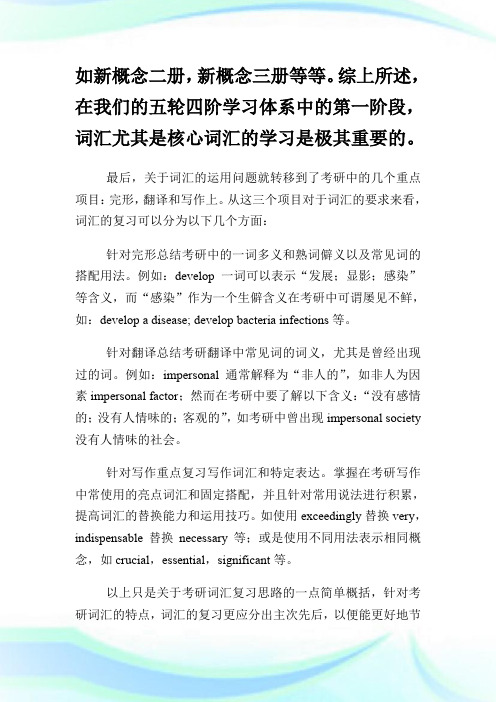
如新概念二册,新概念三册等等。
综上所述,在我们的五轮四阶学习体系中的第一阶段,词汇尤其是核心词汇的学习是极其重要的。
最后,关于词汇的运用问题就转移到了考研中的几个重点项目:完形,翻译和写作上。
从这三个项目对于词汇的要求来看,词汇的复习可以分为以下几个方面:
针对完形总结考研中的一词多义和熟词僻义以及常见词的搭配用法。
例如:develop一词可以表示“发展;显影;感染”等含义,而“感染”作为一个生僻含义在考研中可谓屡见不鲜,如:develop a disease; develop bacteria infections等。
针对翻译总结考研翻译中常见词的词义,尤其是曾经出现过的词。
例如:impersonal通常解释为“非人的”,如非人为因素impersonal factor;然而在考研中要了解以下含义:“没有感情的;没有人情味的;客观的”,如考研中曾出现impersonal society 没有人情味的社会。
针对写作重点复习写作词汇和特定表达。
掌握在考研写作中常使用的亮点词汇和固定搭配,并且针对常用说法进行积累,提高词汇的替换能力和运用技巧。
如使用exceedingly替换very,indispensable替换necessary等;或是使用不同用法表示相同概念,如crucial,essential,significant等。
以上只是关于考研词汇复习思路的一点简单概括,针对考研词汇的特点,词汇的复习更应分出主次先后,以便能更好地节
省时间,加快速度,提高效率,从而在考研中做到胜算在握。
希望能通过这篇文章提醒2014考研的考生“一年之计在于春”,把握考研的黄金时间,把握重点,走好成功的第一步。
2014考研英语语法讲义

考研语法讲义——长难句分析策略主讲讲师:连俊霞总论:一、考研语法在各题型直接命题点的体现:1.阅读:定语从句、宾语从句、状语从句------现在分词、过去分词、比较结构------主语从句。
2.完形:定语从句、宾语从句、状语从句------现在分词、过去分词------主语从句、比较结构、同位语从句。
3.翻译:定语从句------状语从句、宾语从句、现在分词------过去分词------比较结构、倒装------同位语从句、表语从句。
二、英语句法规则:一个句子中有且只能有一个核心动词。
㈠分号和并列连词可以连接多个独立的句子,构成并列句;多个句子之间是平等关系;多句的动词共同构成句子的核心动词。
㈡复合句分为主句和从句两部分,由从属连词连接;主句的动语是核心动词;主从句之间属于上下级关系。
三、长难句分析六步走1.(2010Text4) These (changes) gave banks more freedom to use models to value illiquid assets (非流动资产) and more flexibility in recognizing losses on long-term assets in their income statements (损益计算).2. (2001完形)The government is to ban payments to witnesses by newspapers seeking to buy up people involved in prominent cases such as the trial of Rosemary West.3. (2005Text1)Whether such a sense of fairness evolved independently in monkeys and humans, or whether it stems from the common ancestor that the species had 35 million years ago, is , as yet, an unanswered question.(2005-25) What can we infer from the last paragraph?[A] Monkeys can be trained to develop social emotions.[B] Human indignation evolved from an uncertain source.[C] Animals usually show their feelings openly as humans do.[D] Cooperation among monkeys remains stable only in the wild.4. (2008Text2) The Internet—and pressure from funding agencies, who are questioning why commercial publishers are making money from government-funded research by restricting access to it—is making access to scientific results a reality.四、基本知识补充1. 句子成分:主干成分——主语、谓语/系词、宾语/表语修饰成分——定语、状语和补语例:When it comes to English test, he, who is a college student, considers grammar most important.2. 由词到句的扩展:除谓语和补语外,任何其他句子成分都可以用句子代替单词或短语构成从句。
2014考研英语知识运用部分大纲解析(权威考研机构提供)

2013年考研英语大纲单词变化统计表在新出炉的2013年考研英语大纲中,在英语一和英语二的考纲中就单词部分均进行了局部微调,主要是在往年大纲的基础上删除了42个单词,新增了59个单词,为了便于广大考研学习针对词汇部分的变化进行及时高效的复习,万学海文教研中心特此统计出了单词变化对比表。
新增减少变化1 accustomed 1 abundance accustom2 alienate 2 accidental3 allegiance 3 agreement4 ape 4 attendance5 archeology 5 bearing6 bail 6 beforehand7 blog 7 blackmail8 botany 8 breadth9 buzz 9 building10 censorship 10 capitalism11 comet 11 certainly钻石卡高级辅导系统——全程、全方位、系统化解决考研所有问题,成功率趋近100%万学教育官方网址:112 contagious 12 coincidence13 converge 13 comfortable14 culprit 14 compensation15 daunt 15 complication16 debut 16 concerning17 default 17 construction18 defendant 18 container19 defer 19 contradiction20 deplore 20 conventional21 diabetes 21 corresponding22 dinosaur 22 customary23 dioxide 23 daytime24 embryo 24 directly25 endorse 25 discharge26 ethic 26 disregard27 fiscal 27 elderly28 franchise 28 establishment钻石卡高级辅导系统——全程、全方位、系统化解决考研所有问题,成功率趋近100%万学教育官方网址:229 freelance 29 experimental30 genre 30 heading31 glacier 31 housing32 guild 32 improvement33 herald 33 jeans34 hormone 34 learned35 hygiene 35 learning36 inaugurate 36 monthly37 ivory 37 noticeable38 lyric 38 perfection39 marathon 39 quarterly40 memorandum 40 replacement41 neutron 41 shortly42 nostalgic 42 steamer43 obesity 43 transition44 overhaul 44 wretched45 plaintiff 45 writing钻石卡高级辅导系统——全程、全方位、系统化解决考研所有问题,成功率趋近100%万学教育官方网址:3钻石卡高级辅导系统——全程、全方位、系统化解决考研所有问题,成功率趋近100%万学教育官方网址:4 46portfolio 47recession 48redeem 49rehearse 50salient 51scenario 52snobbish 53stagnant 54statistics 55taboo 56toil 57transit 58turmoil 59vaccine。
2014考研英语高频词汇汇总 - 卡片版
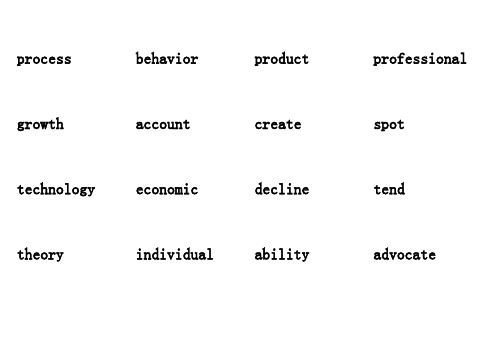
process growth technology theory behavioraccounteconomicindividualproductcreatedeclineabilityprofessionalspottendadvocateamount community environment factor intelligencesocialconsequencedrugextendindustrialmoralactionambitioncapacitydetailevidenceevolution fund inflation local . maintainmanagementproductivitysurviveuniverselearnadvertisingaffectbenefitdebatedirectlyelementessential identify intend investment reasonableresponsibilityopportunitypersonalityprivatealterappropriateboomcombinecorporationenterprisefederalgas highly issue organ ironorganizationprincipleprojectrecognizespecificstructuresubstancetrendadvantageaspectattitudebalance characteristic claim comment constitutecontractcreativehistoricalinterpretmannermassobtainpowerfulpredictshiftspeciesapproach argument assume blueprint climatecompetitivecomplexconceptconfusecriticalcrudeemergeemployeeexistenceinnovationinterviewinvolve journal link manifest motionobviousperformancepolicypossibilitypressurepropertyprospectrelateresourcesourcesuicideaccess acquire adapt additional aggressiveamateuranalysisariseassumptionassureauthorityavoidbiasbriefcashchallengecommittee conflict consideration constant consumptioncontactconventionconvincecosmicdatadefinitiondeliverydemonstratedenydigitaldisciplinedistinction educate effective electronic emphasisenableestablishextentfocusfunctionfundamentalgenegeniusgiantimplicationimprovementindependent influence instinct intention inventionmechanismobservationoddoffendopposepanelphenomenonphysicalpotentialprolongpsychologicalreflect relevant remark requirement respondresponseresponsiblerevolutionscalesecuresitestatusstockstresssufficientsympathythreaten unemployment voteabroad appealcaptiveinfrastructurepremiumresignspantitleabandonacknowledgeadditionadvertisementaidannoy apparent appreciate artificial assembleattributebidcareerceremonycharactercommercialcommitcommoditycomparativecomparisoncompensationconduct conference confidence confront contrast conventional criminal crisis critic current cycle define deprivederivedeservedevicediminish disappear discard easily efficientemployerentitleestimateexecutiveexpenseexportexternalfascinatefashionfatalflashforbid formal formation former grossguaranteehappinessharmfulhenceillustrateimplyindicateinevitableintellectualintelligentinternaljustify label manufacture modify monopolymostlyneglectneverthelessnotionnuclearoffspringsing.originatepacepainfulpoliticspossess poverty privilege profit promoteproportionpursueradicalrangerarelyrealityregisterregulaterejectremarkablereplacerepresent restriction reveal reward rivalscattersecurityskilledstoragestrivestylesurplussurroundsurvivaltargettendencytrace tradition transform union utilityvalidvisiblewisdomworthwhileabuseacquisitionactivatealternativeanticipateassessassignassignment associate attain ban bind budget candidate casual census circumstance colleague compel complaintcomposecomprehensionconclusionconfusion congress connection considerate contendcontextcontrarycontributecounselcrucialdecreasedemocraticdependentdisputedisregarddistortdistract diverse draft drift economicsefficiencyendangerendureenlargeenlightenenormousensureequipequivalentessayestablishmentevolve exceed excess extreme fadefailurefictionflourishfolkforecastformulategenerategeologyglobalgrantgravityhandle hesitate highlight hospitality idealimmigrantimmuneimpactimportimposeinferiorinforminquiryinstanceinstantinstrumentinsurance interact irritate keen legislationleisureliabilitylogicalmankindmathematicalmilitarymodemoreovermotivemultitudenoveloblige opponent optimistic organic outputphasepreciseprejudicepresenceprimarypromptproofproposepropositionoutlookprosperityprovision random rare readily reckonrecoveryregionregretrelievereligionresistrevolveschedulescreenselectsensitivesignificance slip solution somewhat spitestakestandardizesteer.strategystreamsubstantialtrailtransitiontransmittransporttrialtypical underlie unfortunately unknown unlike prep.unusualurgentvainverifyviaviolencewhereasabideabsorbabundantaccelerateaccomplish accordingly accuracy accuse adoptadvisableaffiliatealcoholalternateambitiousampleannualapplicationarbitraryartisticassertattach automobile aware awkward backgroundballoonbarelybehalfbesides prep.boundbrakebulkcapablecautionceasechannelchop classify cluster coincidence commercecommunicatecomparablecompensatecompetecomplicatedconcentrateconferconfessconfineconfirmconformconsent conservative consistent contemporary contestcontradictcontributionconveniencecostlycrackcriticismcriticizedeemdefinitedemocracydependencedesirable dignity disgrace disperse displaydistinctdistinguishdiversiondominatedoomdoubtfuldragdramaticeleganteliminateeliteembrace encounter engine enhance enrich.envyepidemicexaggerateexceedinglyexceptionalexcessiveexhaustexpandexposefaultyfavourablefeature femalefertile fierce filefinanceflexiblefluctuateforthfoundationframefrontierfrustratefuriousfurthermoreglimpseglobe gradual hardship hasten hemispherehosthouseholdhumbleignorantillegalimpressionincorporateindicativeindifferentinitialinitiateinitiative inject injury input installinstructorintenseintensiveinterfereinteriorintervalinvestisolatejamkindnessknotlaughter leading likewise limitation loanlumpmagnitudemaintenancemanipulatemediummigratemildmonetarymoodmultiplemunicipalmyth necessity nerve objective occupationoptionalorientorientationoriginalovercomeoverlookoverseasoverwhelmingowingparallelparalyzepartial participant passport perceive percentageperplexpersistpersonnelphilosopherplausiblepopportionposepracticallyprecedeprescribeprocedure productive profound puzzle qualifyquestionablequoteragerationalrawrectifyreinforcerelationshipreliablereliefremoterender renew resent reserve resortrestrictresumeretireretreatrevenuereverseroutinerudesacrificescopeseniorsensation series severe shortly shrinksimplifysketchsplitsqueezestationarystimulatestumblesubmitsubstitutesubtlesuggestionsuperior surpass suspicious sustain symboltaxteenagertempt.thoroughthrivetimelytraittransfertriumphtwin undergoundertakeunique universal urge validity vanishvaryvehiclevirtualvirtuevirusvitalvolcanovolumewitnessworthyvelocityyield absorption abundance academy accommodateaccordanceaccumulateaccurateacquaintadjectiveadjoinadjustadmirationagentagitateagony。
2014年考研英语二 大纲pdf

2014年考研英语二大纲pdf全文共10篇示例,供读者参考篇1Hey guys, do you know what a "2014 pdf" is? It's basically a document that tells you all the important stuff you need to know for the English exam of the graduate entrance examination in 2014.In this PDF, you can find information about the exam format, the types of questions you might encounter, and tips on how to prepare for the test. It's like a secret guide that will help you do well on the exam!One important thing to remember is to practice your English skills as much as you can. Try reading English books, watching English movies, and talking to your friends in English. The more you practice, the better you will get.Another tip is to make a study schedule and stick to it. Don't wait until the last minute to start preparing for the exam. Start early and review your notes regularly.And remember, it's okay to ask for help if you don't understand something. Your teachers, parents, and friends are all there to support you. Don't be afraid to reach out to them for help.So, if you want to do well on the 2014 exam, make sure to study hard, practice your English skills, and ask for help when you need it. Good luck!篇2Hi, everyone! Today, I want to talk about the 2014 Postgraduate English Test for you. It's a big deal for a lot of people, so let's dive in and see what it's all about!First off, the English Test in 2014 had a lot of different sections. There was listening, reading comprehension, translation, and writing. Each part tested a different skill, so you had to be on your toes the whole time.The listening part was super important because you had to listen to a recording and answer questions about it. Sometimes they spoke really fast, so you had to pay close attention. And if you missed something, you were in trouble!The reading comprehension part was all about understanding long passages of text. They asked you questions to see if you really got the main idea. It was tough, but if you practiced a lot, you could do really well.Translation was another tricky part. You had to take a passage in Chinese and translate it into English. You had to be really good at both languages to do well on this part.And finally, the writing section was where you had to show off your English skills. You had to write essays and short answers, and make sure your grammar and vocabulary were top-notch.Overall, the 2014 Postgraduate English Test was a real challenge, but if you studied hard and practiced a lot, you could do great! Good luck to anyone taking the test this year – you've got this!篇3Oh my goodness! The 2014 postgraduate entrance exam for English is really hard! But don't worry, I've got the outline for you. Let's break it down together!In the reading comprehension section, there will be four passages for you to read and answer questions about. Make sureyou pay attention to the details and understand the main ideas of each passage. Don't forget to use keywords to help you find the answers faster!Next up is the cloze test, where you'll have to fill in the blanks with the appropriate words. Remember to read the entire passage first to get a sense of the overall theme before tackling the blanks.Then there's the translation section, where you'll have to translate English sentences into Chinese. Take your time and make sure you understand the nuances of each sentence before translating.In the writing section, you'll be asked to write an essay on a given topic. Be sure to organize your thoughts and use proper grammar and vocabulary. Don't forget to check for spelling and punctuation errors!Finally, there's the listening comprehension section, where you'll listen to recordings and answer questions. Pay close attention to the speaker's tone and intonation to better understand the context.Don't stress out too much, just do your best and remember to practice, practice, practice! Good luck on the exam, you got this!篇4Hey guys, have you heard about the 2014 English exam? It's supposed to be super tough, but don't worry, I'm here to break it down for you in a fun and easy way!First off, let's talk about the reading section. Make sure you read the passage carefully and underline any key points. This will help you answer the questions more easily. Also, don't forget to pay attention to vocabulary and grammar - they can be tricky!Next up is the listening section. Make sure you listen carefully to the audio and try to understand the main ideas. Take notes if you need to, and don't be afraid to ask for clarification if you're unsure about something.Now onto the writing section. Make sure you plan out your essay before you start writing. Use clear and concise language, and don't forget to check for spelling and grammar errors. Remember, practice makes perfect!And finally, the speaking section. Speak clearly and confidently, and don't be afraid to express your opinions. Remember to listen to the prompts carefully and answer them thoughtfully.Overall, the key to success in the 2014 English exam is practice and preparation. So study hard, stay focused, and believe in yourself. You got this! Good luck!篇5Hello everyone, I want to talk about the ***2014 pdf***. This is a very important document that can help us with our English study. It's like a treasure map that shows us the way to improve our English skills and achieve our goals.First of all, the ***2014 pdf*** contains a lot of useful information about the topics that will be covered in the exam. It tells us what we need to study and gives us guidance on how to prepare. By following the guidelines in the document, we can focus on the most important areas and make sure we are ready for the exam.Secondly, the ***2014 pdf*** also includes sample questions and practice exercises. These are very helpful because they give us a chance to test our understanding and practice our skills. Byworking through the questions and exercises, we can improve our English proficiency and gain confidence in our abilities.In addition, the ***2014 pdf*** provides tips and strategies for taking the exam. It gives us advice on how to manage our time, approach different types of questions, and deal with test anxiety. By following these suggestions, we can perform at our best and achieve a high score on the exam.Overall, the ***2014 pdf*** is a valuable resource for anyone preparing for the English exam. It can help us identify our strengths and weaknesses, focus our study efforts, and be better prepared on exam day. So let's make the most of this document and work hard to achieve our goals!篇6Title: My Thoughts on the 2014 GRE English II Outline PDFHey guys! Today I want to chat with you about the 2014 GRE English II Outline PDF. You know, that big ol' document that tells us what we need to know for the test.First things first, let's talk about the reading section. It's important to read the passages carefully and pay attention to the details. Don't just skim through, make sure you really understandwhat the author is trying to say. And remember to take notes so you can refer back to them later.Next up is the vocabulary section. I know, I know, memorizing all those words can be a pain. But trust me, it's worth it. Try making flashcards or using vocabulary apps to help you remember those tricky words. And don't forget to review them regularly so they stick in your brain.Now onto the writing section. This is where you get to show off your creative side. Be sure to plan out your essay before you start writing, and remember to stay on topic. Use examples and evidence to support your arguments, and don't forget to proofread for any spelling or grammar mistakes.Overall, the 2014 GRE English II Outline PDF is a helpful tool to prepare for the test. Just remember to study hard, stay focused, and believe in yourself. You got this! Good luck, my fellow test-takers!篇7Hey everyone, have you heard about the 2014 Postgraduate English Exam? It's like a big deal for all the students who want to go to graduate school. In this article, we're going to talk about the exam outline and some tips to help you prepare for it.First of all, let's talk about the exam outline. The 2014 Postgraduate English Exam has three parts: listening, reading, and writing. In the listening part, you have to listen to some recordings and answer questions. It can be a bit tricky, but if you practice a lot, you'll be fine.In the reading part, you have to read some passages and answer questions about them. This part is all about understanding the main ideas and details of the text. Make sure you read carefully and don't skip any details.Finally, in the writing part, you have to write an essay on a given topic. This part is super important because it shows your ability to express your ideas clearly and logically. Make sure you organize your thoughts before you start writing.Now, let's talk about some tips to help you prepare for the exam. First, make a study plan and stick to it. Set aside some time each day to practice listening, reading, and writing. Second, practice with past exam papers. This will help you get familiar with the format and types of questions you might encounter. Third, work on your vocabulary and grammar. Try to learn new words and phrases every day and practice using them in sentences.Remember, the key to success in the 2014 Postgraduate English Exam is practice, practice, practice. So, work hard and don't give up. Good luck!篇8Yo guys, have you ever heard about this super cool thing called the 2014 National Postgraduates Entrance Exam for English major? It's like a big test where you gotta show off all your English skills and be super smart. And guess what, I found the outline for the exam in a pdf file!This exam is like a big deal because it can help you get into a really good university and make all your dreams come true. The exam covers all kinds of stuff like reading, listening, writing, and speaking. It's like a challenge that you gotta face head-on.In the reading section, you gotta read all kinds of passages and answer questions about them. It's all about understanding what the passage is saying and showing off your reading skills. The listening section is super fun because you get to listen to all kinds of cool stuff like conversations and speeches. Then you gotta answer questions about what you heard.The writing section is where you can really show off your creativity and English skills. You gotta write essays and expressyour thoughts in a clear and organized way. And finally, the speaking section is all about being confident and speaking English fluently. You gotta talk about different topics and show off your speaking skills.So guys, if you wanna ace this super cool exam and make all your dreams come true, you gotta study hard and practice a lot. Remember, practice makes perfect! So let's all work hard together and show off our English skills in the 2014 National Postgraduates Entrance Exam for English major! Let's do this!篇9Hi guys, do you want to know what is in the 2014pdf? Well, let me tell you all about it in a fun and easy way.First of all, in the 2014pdf, you will find lots of different topics to study. There are things like reading comprehension, vocabulary, grammar, writing, and even listening! It's like a big treasure chest of English knowledge waiting for you to explore.When you study reading comprehension, you will learn how to read passages and answer questions about them. You will also practice your vocabulary by learning new words and their meanings. And don't forget about grammar! You will learn allabout different parts of speech and how to use them correctly in sentences.In the writing section, you will get to practice writing essays and other types of compositions. You will learn how to organize your ideas and express them clearly in English. It's a great way to improve your writing skills and impress your teachers.And last but not least, there is the listening section. In this part, you will listen to recordings and answer questions about what you hear. It's a fun way to practice your listening skills and improve your ability to understand spoken English.So, if you want to do well on the 2014 exam, make sure to study hard and practice all the different topics in the pdf. Good luck, everyone!篇10Hi guys, today I want to talk about the 2014 National Entrance Examination for Postgraduates (NEEP) English exam. It's like a super important test for people who want to go to graduate school. Let's dive in and see what it's all about!First off, the exam has two parts: Reading and Writing. The Reading part is all about understanding and analyzing differenttexts like articles, essays, and short stories. You have to answer questions about them and show off your comprehension skills. It can be a bit tricky, but if you read carefully and take your time, you should do just fine.Next up is the Writing part, where you have to write an essay on a given topic. This is your chance to show off your creativity and language skills. Make sure to organize your ideas well and use proper grammar and vocabulary. And don't forget to check your spelling!It's super important to practice a lot before the exam. You can read English books, watch English movies, and even chat with your friends in English. The more you practice, the better you'll get.So, if you want to ace the 2014 NEEP English exam, remember to read carefully, write clearly, and practice a ton. Good luck, and I know you'll do awesome!。
海天考研英语写作词汇讲义(王军)
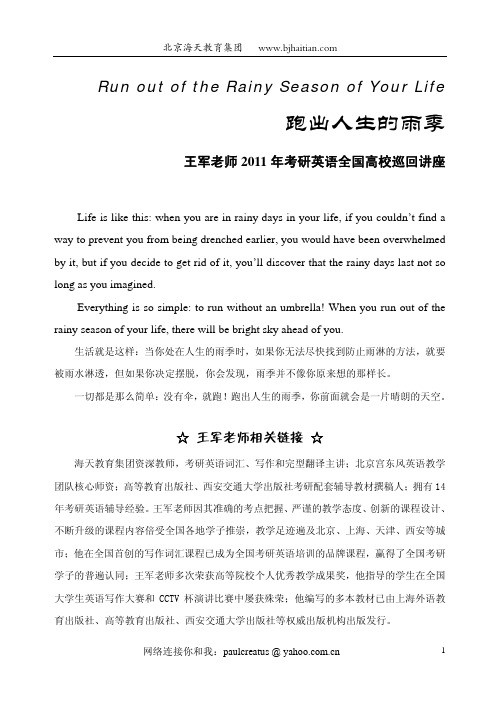
Run out of the Rainy Season of Your Life跑出人生的雨季王军老师2011年考研英语全国高校巡回讲座Life is like this: when you are in rainy days in your life, if you couldn’t find a way to prevent you from being drenched earlier, you would have been overwhelmed by it, but if you decide to get rid of it, you’ll discover that the rainy days last not so long as you imagined.Everything is so simple: to run without an umbrella! When you run out of the rainy season of your life, there will be bright sky ahead of you.生活就是这样:当你处在人生的雨季时,如果你无法尽快找到防止雨淋的方法,就要被雨水淋透,但如果你决定摆脱,你会发现,雨季并不像你原来想的那样长。
一切都是那么简单:没有伞,就跑!跑出人生的雨季,你前面就会是一片晴朗的天空。
☆ 王军老师相关链接☆海天教育集团资深教师,考研英语词汇、写作和完型翻译主讲;北京宫东风英语教学团队核心师资;高等教育出版社、西安交通大学出版社考研配套辅导教材撰稿人;拥有14年考研英语辅导经验。
王军老师因其准确的考点把握、严谨的教学态度、创新的课程设计、不断升级的课程内容倍受全国各地学子推崇,教学足迹遍及北京、上海、天津、西安等城市;他在全国首创的写作词汇课程已成为全国考研英语培训的品牌课程,赢得了全国考研学子的普遍认同;王军老师多次荣获高等院校个人优秀教学成果奖,他指导的学生在全国大学生英语写作大赛和CCTV杯演讲比赛中屡获殊荣;他编写的多本教材已由上海外语教育出版社、高等教育出版社、西安交通大学出版社等权威出版机构出版发行。
石家庄海天考研:2014考研专业课复习攻略
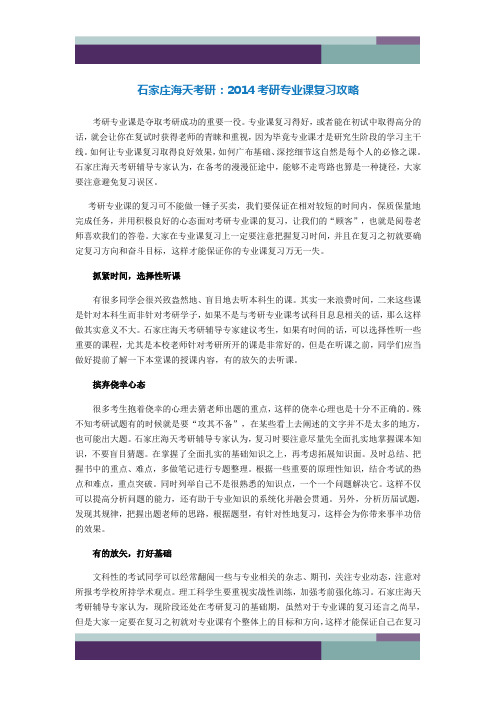
石家庄海天考研:2014考研专业课复习攻略考研专业课是夺取考研成功的重要一役。
专业课复习得好,或者能在初试中取得高分的话,就会让你在复试时获得老师的青睐和重视,因为毕竟专业课才是研究生阶段的学习主干线。
如何让专业课复习取得良好效果,如何广布基础、深挖细节这自然是每个人的必修之课。
石家庄海天考研辅导专家认为,在备考的漫漫征途中,能够不走弯路也算是一种捷径,大家要注意避免复习误区。
考研专业课的复习可不能做一锤子买卖,我们要保证在相对较短的时间内,保质保量地完成任务,并用积极良好的心态面对考研专业课的复习,让我们的“顾客”,也就是阅卷老师喜欢我们的答卷。
大家在专业课复习上一定要注意把握复习时间,并且在复习之初就要确定复习方向和奋斗目标,这样才能保证你的专业课复习万无一失。
抓紧时间,选择性听课有很多同学会很兴致盎然地、盲目地去听本科生的课。
其实一来浪费时间,二来这些课是针对本科生而非针对考研学子,如果不是与考研专业课考试科目息息相关的话,那么这样做其实意义不大。
石家庄海天考研辅导专家建议考生,如果有时间的话,可以选择性听一些重要的课程,尤其是本校老师针对考研所开的课是非常好的,但是在听课之前,同学们应当做好提前了解一下本堂课的授课内容,有的放矢的去听课。
摈弃侥幸心态很多考生抱着侥幸的心理去猜老师出题的重点,这样的侥幸心理也是十分不正确的。
殊不知考研试题有的时候就是要“攻其不备”,在某些看上去阐述的文字并不是太多的地方,也可能出大题。
石家庄海天考研辅导专家认为,复习时要注意尽量先全面扎实地掌握课本知识,不要盲目猜题。
在掌握了全面扎实的基础知识之上,再考虑拓展知识面。
及时总结、把握书中的重点、难点,多做笔记进行专题整理。
根据一些重要的原理性知识,结合考试的热点和难点,重点突破。
同时列举自己不是很熟悉的知识点,一个一个问题解决它。
这样不仅可以提高分析问题的能力,还有助于专业知识的系统化并融会贯通。
另外,分析历届试题,发现其规律,把握出题老师的思路,根据题型,有针对性地复习,这样会为你带来事半功倍的效果。
2014考研英语大纲权威解析和备考思路
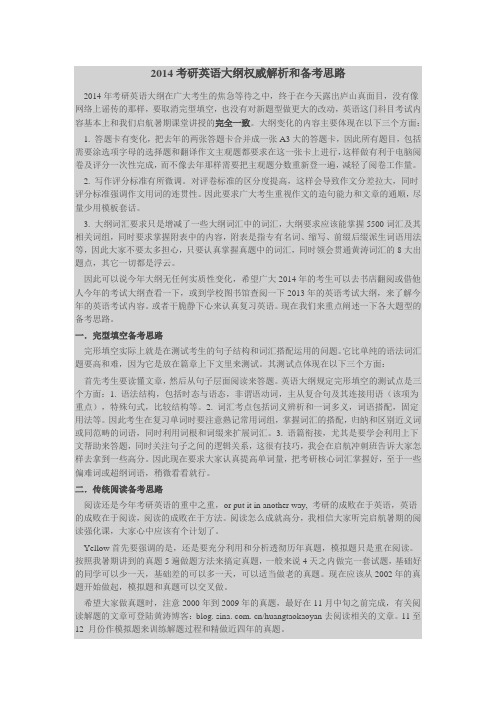
2014考研英语大纲权威解析和备考思路2014年考研英语大纲在广大考生的焦急等待之中,终于在今天露出庐山真面目,没有像网络上谣传的那样,要取消完型填空,也没有对新题型做更大的改动,英语这门科目考试内容基本上和我们启航暑期课堂讲授的完全一致。
大纲变化的内容主要体现在以下三个方面:1. 答题卡有变化,把去年的两张答题卡合并成一张A3大的答题卡,因此所有题目,包括需要涂选项字母的选择题和翻译作文主观题都要求在这一张卡上进行,这样做有利于电脑阅卷及评分一次性完成,而不像去年那样需要把主观题分数重新登一遍,减轻了阅卷工作量。
2. 写作评分标准有所微调。
对评卷标准的区分度提高,这样会导致作文分差拉大,同时评分标准强调作文用词的连贯性。
因此要求广大考生重视作文的造句能力和文章的通顺,尽量少用模板套话。
3. 大纲词汇要求只是增减了一些大纲词汇中的词汇,大纲要求应该能掌握5500词汇及其相关词组,同时要求掌握附表中的内容,附表是指专有名词、缩写、前缀后缀派生词语用法等,因此大家不要太多担心,只要认真掌握真题中的词汇,同时领会贯通黄涛词汇的8大出题点,其它一切都是浮云。
因此可以说今年大纲无任何实质性变化,希望广大2014年的考生可以去书店翻阅或借他人今年的考试大纲查看一下,或到学校图书馆查阅一下2013年的英语考试大纲,来了解今年的英语考试内容。
或者干脆静下心来认真复习英语。
现在我们来重点阐述一下各大题型的备考思路。
一.完型填空备考思路完形填空实际上就是在测试考生的句子结构和词汇搭配运用的问题。
它比单纯的语法词汇题要高和难,因为它是放在篇章上下文里来测试。
其测试点体现在以下三个方面:首先考生要读懂文章,然后从句子层面阅读来答题。
英语大纲规定完形填空的测试点是三个方面:1. 语法结构,包括时态与语态,非谓语动词,主从复合句及其连接用语(该项为重点),特殊句式,比较结构等。
2. 词汇考点包括词义辨析和一词多义,词语搭配,固定用法等。
2014考研英语辅导大学英语六级写作讲义范文

2014考研英语辅导大学英语六级写作讲义目录第一章知彼知己................................................................................................ 错误!未定义书签。
第一节大纲要求......................................................................................... 错误!未定义书签。
第二节评分标准......................................................................................... 错误!未定义书签。
第二章真题类型................................................................................................ 错误!未定义书签。
第一节论说文............................................................................................. 错误!未定义书签。
(一)现象解析类.............................................................................. 错误!未定义书签。
(二)观点论证类.............................................................................. 错误!未定义书签。
第二节应用文............................................................................................. 错误!未定义书签。
石家庄海天:2014考研英语如何取得进展
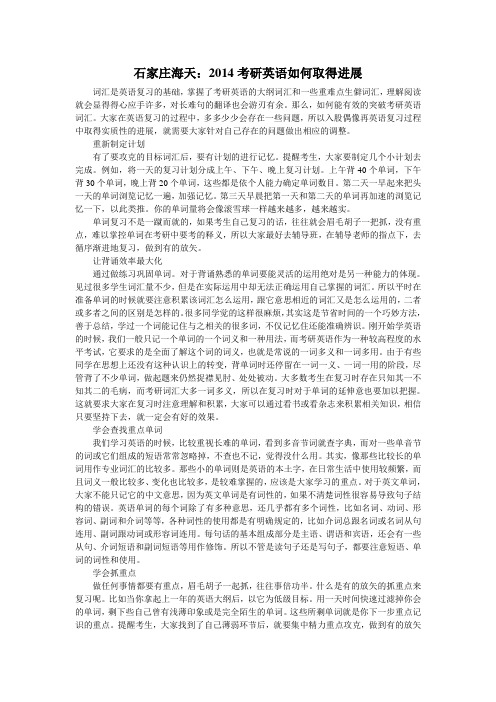
石家庄海天:2014考研英语如何取得进展词汇是英语复习的基础,掌握了考研英语的大纲词汇和一些重难点生僻词汇,理解阅读就会显得得心应手许多,对长难句的翻译也会游刃有余。
那么,如何能有效的突破考研英语词汇。
大家在英语复习的过程中,多多少少会存在一些问题,所以入股偶像再英语复习过程中取得实质性的进展,就需要大家针对自己存在的问题做出相应的调整。
重新制定计划有了要攻克的目标词汇后,要有计划的进行记忆。
提醒考生,大家要制定几个小计划去完成。
例如,将一天的复习计划分成上午、下午、晚上复习计划。
上午背40个单词,下午背30个单词,晚上背20个单词,这些都是依个人能力确定单词数目。
第二天一早起来把头一天的单词浏览记忆一遍,加强记忆。
第三天早晨把第一天和第二天的单词再加速的浏览记忆一下,以此类推。
你的单词量将会像滚雪球一样越来越多,越来越实。
单词复习不是一蹴而就的,如果考生自己复习的话,往往就会眉毛胡子一把抓,没有重点,难以掌控单词在考研中要考的释义,所以大家最好去辅导班,在辅导老师的指点下,去循序渐进地复习,做到有的放矢。
让背诵效率最大化通过做练习巩固单词。
对于背诵熟悉的单词要能灵活的运用绝对是另一种能力的体现。
见过很多学生词汇量不少,但是在实际运用中却无法正确运用自己掌握的词汇。
所以平时在准备单词的时候就要注意积累该词汇怎么运用,跟它意思相近的词汇又是怎么运用的,二者或多者之间的区别是怎样的。
很多同学觉的这样很麻烦,其实这是节省时间的一个巧妙方法,善于总结,学过一个词能记住与之相关的很多词,不仅记忆住还能准确辨识。
刚开始学英语的时候,我们一般只记一个单词的一个词义和一种用法,而考研英语作为一种较高程度的水平考试,它要求的是全面了解这个词的词义,也就是常说的一词多义和一词多用。
由于有些同学在思想上还没有这种认识上的转变,背单词时还停留在一词一义、一词一用的阶段,尽管背了不少单词,做起题来仍然捉襟见肘、处处被动。
2014考研英语辅导:完型词汇题解题剖析

2014考研英语辅导:完型词汇题解题剖析英语知识运用是较为全面地考查微观语言的形式。
要求学生在全面理解一篇短文的基础上,从所给出的四个选项中选择一个最佳答案替代文中相应的空白处,在此基础上,短文的意思和结构恢复完整。
短文的长度一般为240-280个单词,文体多为说明文和议论文,短文的题材通常涉及语法知识、词汇知识以及篇章结构知识。
总而言之,这部分主要考查的是考生对英语知识的综合运用能力。
万学海文考研英语教研室的老师们对近10年来的相关真题做了详细地研究,得出的结果是:在20道小题中,通常12-16道题是在考查与词汇相关的知识运用,比如词义的辨析、短语搭配、习语等;4-8道题考查语法结构和篇章结构。
所以,词汇题的考查在这部分占了大半壁江山,显示出其极端重要性,2014年考生在复习备考的时候,一定要加强这方面能力的培养。
2014年英语知识运用词汇考查分布图词性分布数量动词9形容词4副词1介词5英语知识运用部分考查词汇的形式是非常灵活的,比如一个词可以用作不同的词性,搭配和词义也有相应的变化。
所以,万学海文提醒2014年的考生不仅要知道其“释义”,而且要知道它的“用法”。
与此同时,考生在熟记词义的时候,必须要灵活地掌握词汇在不同语境中的运用情况。
一、同义词和近义词很多考生在背单词的时候,往往脱离语境孤立地去背,实际上,英语单词的意思在不同的语境下意思往往是不同的,我们在复习备考的时候,一定要把单词还原到具体的语境,只有如此,我们才能更加准确地把握其不同意思。
在表示大致相同意思的单词中比较准确地辨别它们间细微的差别。
而区分单词间细微的差别往往是英语知识运用部分所考查的要点之一。
This means that our nose are3 perceiving those smells which float through the air, missing the majority of smells which stick to surface.3, A limited B committed C dedicated D confined答案解析:此考题中A. limited(局限于)D. confined(限制于)属于近义词;B. committed(专注于)和D. dedicated(一心一意于)属于近义词类型。
2014考研英语词汇突破_何凯文讲义
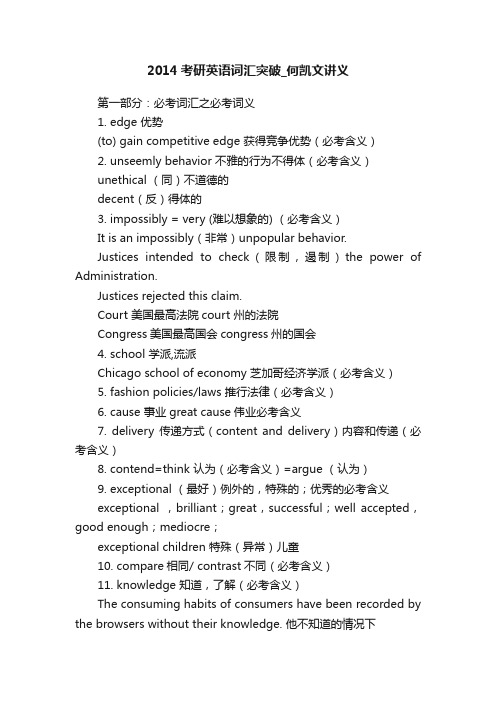
2014考研英语词汇突破_何凯文讲义第一部分:必考词汇之必考词义1. edge 优势(to) gain competitive edge 获得竞争优势(必考含义)2. unseemly behavior 不雅的行为不得体(必考含义)unethical (同)不道德的decent(反)得体的3. impossibly = very (难以想象的) (必考含义)It is an impossibly(非常)unpopular behavior.Justices intended to check(限制,遏制)the power of Administration.Justices rejected this claim.Court 美国最高法院court 州的法院Congress美国最高国会congress州的国会4. school 学派,流派Chicago school of economy 芝加哥经济学派(必考含义)5. fashion policies/laws 推行法律(必考含义)6. cause 事业great cause伟业必考含义7. delivery 传递方式(content and delivery)内容和传递(必考含义)8. contend=think 认为(必考含义)=argue (认为)9. exceptional (最好)例外的,特殊的;优秀的必考含义exceptional ,brilliant;great,successful;well accepted,good enough;mediocre;exceptional children 特殊(异常)儿童10. compare相同/ contrast不同(必考含义)11. knowledge 知道,了解(必考含义)The consuming habits of consumers have been recorded by the browsers without their knowledge. 他不知道的情况下12. weather the crisis度过危机克服(必考含义)13. intelligence (天生的)智商;情报(必考含义)intellect知识分子;知识(通过学习获得的智力)Intellectualism理智主义anti- 反智主义14. discipline 纪律,教训,惩罚,学科;(必考含义)15. overlook忽视overrate16. acquisitive(对钱财等)渴望得到的,贪得无厌的;vanity虚荣;vulgar粗俗的; greedy(贪婪的)17. fairly相当地(过得去)或者strictly = very = strikingly显著地= deliciously非常ironic讽刺意味18. Approach :方法(必考词义)19. push (推)进取,积极passion热情,work,focus,push,ideas, improve, work, persist.20. high profile (颜面,轮廓,侧面)必考词义形容人:高调的;形容事情:引人注目的;much publicized(宣传(publicize的过去分词);公布;广告)同意替换21. game 猎物22. spell 一段时间(optimistic spell)1.拼写2.导致3. 一段时间Despite a spell of initial optimism in the 1960s and 1970s23. odd = strange ; odd staff (临时工)= chance奇数的;古怪的;剩余的;临时的;零散的24. controversialist (必考词义)有争议的人=tissue25. entertaining = interesting =funny (有趣的)26. code 规则;准则27.far-reaching影响深远的; farfetched 不靠谱,牵强28. the superiority 强势群体=The powerfulThe inferiority弱势群体=The powerless29. blameA is to blame for B. 由于A造成了BThat is not to say that mobile phone alone is to blame for the sorry state of affairs.遗憾的局面,不好的局面30. temper (temple寺庙)=curb(抑制;路边;勒马绳)=control(控制)= harnesstemper the spending 控制支出31. broker ( 经济人) stock(股票)real-estate(房地产)32. vulnerable = susceptible(易于受(做)…的影响/伤害/事情)remain immune toThe young is susceptible to the advertisement.The woman is susceptible to develop extra stress.She is the susceptible nature.The citizens are vulnerable to the exploitation.Vulnerability = weak point弱点33. off shoring 离岸外包(不在本地生产,移在外地)Hedge fund 对冲基金Mercedes-Benz奔驰Blackberry 黑莓M&A(mergers and acquisition)并购Economic Co-operation and Development(OECD)经济合作与发展组织,经合组织National academy of Science(NAS)美国国家科学院Gap美国时尚品牌H&M瑞典连锁服饰品牌(Hennes & Mauritz)Zara西班牙一品牌Matthew Effect 马太效应(指强者愈强、弱者愈弱的现象,广泛应用于社会心理学、教育、金融以及科学等众多领域。
海天考研整理如何牢记掌握大量考研英语词汇

如何牢记掌握大量考研英语词汇英语单词记不住,是专业硕士考生备考期间常见的问题。
大家不要着急,海天考研导师在线为考生支招。
掌握大量的英语词汇,是考研大纲对专业硕士考生最基本的要求。
备考期间,考生如何做才能灵活掌握词汇呢?为了解决词汇记不住的问题,整理出:英语词汇五大记忆方法,帮助考生轻松考研。
1、重点牢记高频英语词汇和高难度英语词汇。
指出:从历届英语试卷可以看出,高频率词汇和高难度词汇是一大考点。
备考期间,考生一定要反复记忆这些词汇。
建议2014专业硕士考生在每天的复习中,做好随时将较难记忆的单词做好标识的准备,然后重点记忆。
2、将写作与单词记忆结合。
专硕考生备考期间,要注意单词记忆与写作的结合。
写作是练笔的好方法,也是词汇从大脑中倾泻到笔端的最好方法。
在背诵单词时,最好定期练习写作,将自己掌握的英语词汇,灵活运用到英语写作中,这样背单词的效果会更明显,同时英语作文的分数也会提高,可谓一举两得。
3、单词背诵和复习相结合。
英语备考期间,考生要学会背诵和复习相结合。
不要一味的背诵单词,而忽略了以前掌握的英语词汇的复习。
人的记忆能力是有限的,即使记得再牢固的英语词汇,过一段时间后也会淡忘,因此需要考生隔三差五地对几天前或一个礼拜前乃至更长时间前背诵的词汇进行复习。
只有这样,才能牢记更多的词汇。
4、挖掘高频次英语词汇。
高频词英语词汇是英语掌握了高频词汇,考生词汇记忆中可以省去很多事。
专业硕士考生必须掌握高频词汇的拼写、基本用法和意思;考生要通过精读历年真题来学习高频词汇,这样,考生可以了解这些词汇经常被考查的考点。
5、单词结合语境记忆。
背单词时,不要孤立的记忆单词,应将单词放在语境下,放在阅读中,这样记忆的效果才会更加明显。
除此之外,在记忆单词的过程中,会熟悉各种语法和常见的短语,进一步提高专业硕士考生的语感,间接提高专硕考生英语答题效率。
备考期间,专硕考生经常会产生负面情绪,滋生放弃考研的念头。
当出现这些情绪时,大家先冷静下来,然后想想自己的梦想,当初考研的原因,那这些情绪就会烟消云散。
考研复习2014年考研英语大纲规定词汇集锦
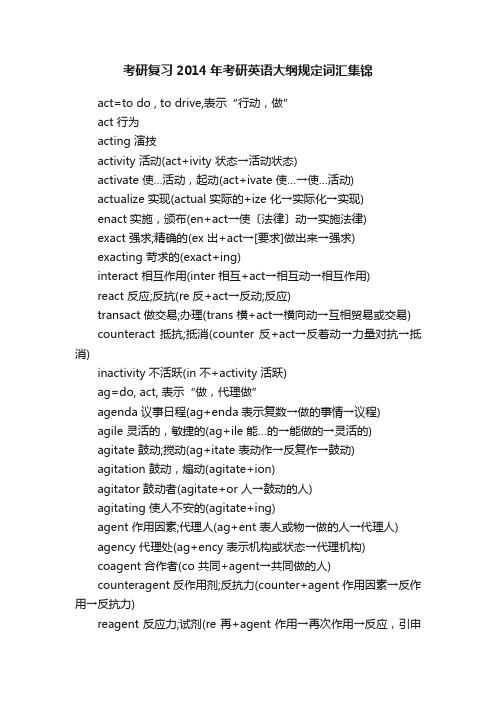
考研复习2014年考研英语大纲规定词汇集锦act=to do , to drive,表示“行动,做”act 行为acting 演技activity 活动(act+ivity 状态→活动状态)activate 使…活动,起动(act+ivate 使…→使…活动)actualize 实现(actual 实际的+ize 化→实际化→实现)enact 实施,颁布(en+act→使〔法律〕动→实施法律)exact 强求;精确的(ex 出+act→[要求]做出来→强求)exacting 苛求的(exact+ing)interact 相互作用(inter 相互+act→相互动→相互作用)react 反应;反抗(re 反+act→反动;反应)transact 做交易;办理(trans 横+act→横向动→互相贸易或交易) counteract 抵抗;抵消(counter 反+act→反着动→力量对抗→抵消)inactivity 不活跃(in 不+activity 活跃)ag=do, act, 表示“做,代理做”agenda 议事日程(ag+enda 表示复数→做的事情→议程)agile 灵活的,敏捷的(ag+ile 能…的→能做的→灵活的)agitate 鼓动;搅动(ag+itate 表动作→反复作→鼓动)agitation 鼓动,煽动(agitate+ion)agitator 鼓动者(agitate+or 人→鼓动的人)agitating 使人不安的(agitate+ing)agent 作用因素;代理人(ag+ent 表人或物→做的人→代理人)agency 代理处(ag+ency 表示机构或状态→代理机构)coagent 合作者(co 共同+agent→共同做的人)counteragent 反作用剂;反抗力(counter+agent 作用因素→反作用→反抗力)reagent 反应力;试剂(re 再+agent 作用→再次作用→反应,引申为化学试剂)2alter, altern, ali=other, to change, 表示“其他的,改变状态”alter 变更,改变(alter 其他的→变成〔其它的〕)alterable 可改变的(alter+able 能…的)alteration 改造,改变(alter+ation 表名词)alternation 交互,交错(alternate+ion)alternative 二者择一(的)(来自alternate 交替,交替选择的方法) alien 外国的,外来的(ali+en 表形容词或名词→其他地方的→外国的,外国人的)alienate 疏远(alien 外国的+ate→把别人当外国人→疏远)am, amor, amat=love,表示“爱,情爱”amatory 恋爱的;色情的(amat+ory→爱的 )amiable 和蔼的,友善的(ami+able 能…的→能〔被〕爱的→亲切的)amicable 友好的,温和的(am+ic+able→能爱〔你〕的→友好的) amity 友好,和睦(am+ity 状态→爱的状态→和睦)enmity 敌意,仇恨(en 进入+am+ity→合成enmity,爱太多的,成为恨)anim=life,spirit, 表示“生命,精神”等aniaml 动物(anim+al→有生命的东西→动物)animate 使有生气,活泼(anim+ate→使有生命)animation 生动;动画(animate 的名词)inanimate 无生命的(in 无+anim+ate 生命)magnanimous 心胸博大的(magn 大+anim 生命+ous→大生命→心胸博大)unanimous 意见一致的(un+anim 生命+ous→[大家]同一个生命→一致的)equanimity 平静;沉着(equ 平等+anim 生命+ity→生命平等→平静)animosity 憎恨,憎恶(anim+osity 多的状态→生命太多→由爱变恨→仇恨)ann, enn=year,表示“年,一年”annual 一年一度的(ann+ual)anniversary 周年纪念(anni+vers 转+ary→一年转到一次→周年纪念日)annuity 年金;养老金(annu+ity 每年的东西→年金)perennial 终年的;长期的(per 始终+ennial 年的→终年的)anthrop=man,human,表示“人,人类”anthropology 人类学(anthrop+ology 学科)philanthropist 博爱主义者(phil 爱+anthrop 人+ist→爱人的家→博爱家)opt,ept=fit, ability,表示“适应,能力”apt 有倾向的,适当的aptitude 适应能力;才能(apt+itude 表示状态→有能力的状态)aptly 适当地(apt+ly)adapt 使适应,适应(环境)(ad 一再+apt→一再适应〔环境〕)adaptable 有适应能力的(adapt 适应+able 能…的)adaptation 适应,(书)改写本(adapt+ation→适应→适应〔各种人〕的书→改写本)3inapt 不适当的;无能的(in 无+apt 能力)adept 熟练的,老练的(ad+ept→有能力→熟练的)arch, archy=ruler, rule, chief, 表示“统治者,统治,主要的”anarchy 无政府状态(an 无+archy)anarchic 无政府主义的(anarchy+ic)anarchism 无政府主义的(an 无+arch+ism 主义)partiarch 家长;族长(parti 父亲+arch→父亲统治→家长)archives 档案(arch+ives 表示东西→统治的东西→统治者的文件→档案)architect 建筑师(archi+tect 做→统治〔造房〕的人→建筑师)architecture 建筑学art=skill, joint, trick, 表示“技巧,关节,诡计”article 物品;文章(art+icle 东西→用技巧做出的东西→物品)artful 巧妙的;狡猾的(art+ful→充满诡计的)artistry 艺术技巧(artist+ry 表名词)artificial 人工的;矫揉造作的(artifice 技巧+ial→用技巧做出的→人工的)artisan 工匠,技工(artu+san 人→技巧之人→工匠)artifact 工艺品(arti+fact 做出的东西,事实→人造物→工艺品) astro,aster=star,表示“星星”astrononmy 天文学(astro+nomy 学科→研究星星的学科)astrospace 宇宙空间(astro+space 空间)astronaut 宇航员(astro+naut 航行员)astrophysics 天体物理学(astro+physics 物理学)astral 星的,星状的(astr+al)disaster 灾难,灾祸(dis 坏+ester 星→星位不正,表示有灾难) disastrous 灾难的(dis+astr+ous)audi,audit=hear,表示“听”audience 听众;观众(audi+ence 表名词→听的人→听众)auditorium 礼堂;讲堂(audit+orium 场所→听的场所)audible 听得见的;可听的(audi+ible 能…的)inaudible 听不见的(in 不+audi+ible)bas,base=low, foundation,表示“低下,基础”base 低下的;基础basement 地下室(base+ment 表名词)baseball 垒球(base+ball 球→建立基础打球→垒球)baseborn 出生低微的(base+born 出生)abase 降低;贬低(自己)(a 使+base 低→使自己低→降低)debase 降低debased 贬低的;品质恶劣的(debase 降低+ed) subbase 基层;基地(sub 下+base→地基下的地基)。
2014上海英语考纲词汇全部(音标版)

2014年上海市初中毕业统一学业考试手册(英语-------------音标版)最新版考纲p134Aability [ə'bɪlətɪ] n. 能力,才能able ['eɪbl] adj. 能够;有能力的about [ə'baʊt] adv. 大约;到处prep. 关于above [əˈbʌv] prep. 在。
上面abroad[əˈbrɔ:d] adv. 到国外accept [ək'sept] v.接收accident ['æksɪdənt] n. 事故accurate [ˈækjərət]adj. 准确的achieve[ə'tʃi:v] v. 达到;获得across [əˈkrɒs] prep. 横过,穿过act [ækt] v. 表演;行动active [ˈæktɪv] adj. 积极的;活跃的activity [æk'tɪvətɪ] n. 活动actor ['æktə] n. 男演员actress[ˈæktrəs] n. 女演员actually英[ˈæktʃuəli] adv. 实际上add [æd] v. 添加,增加addition [əˈdɪʃn] n. 增加address [ə'dres] n. 地址adult [ˈædʌlt] n. 成年人advantage [əd'vɑ:ntɪdʒ] n. 优势,优点advertisement [ədˈvɜ:tɪsmənt] / [ˈædvɜː ˈtaɪzmənt] n. 广告advice [ədˈvaɪs] n. 忠告考纲p135afford [ə'fɔːd] v. 买得起, 抽得出时间afraid [ə'freɪd] adj. 害怕的;恐怕;担心的after ['ɑːftə]prep. 在……之后adv. 后来,以后conj. 在……之后afternoon [ɑːftə'nuːn] n. 午后,下午again [ə'gen; ə'geɪn] adv. 又,此外;再一次;against [ə'genst; ə'geɪnst]prep. 反对,违反;靠;倚;age. [eɪdʒ] n. 年龄;时代;aged ['eɪdʒɪd] adj. 年老的agent ['eɪdʒ(ə)nt] n. 代理人ago [ə'gəʊ] adv. 以前agree [ə'griː] v. 同意;赞成;ahead [ə'hed] adv. 向前;在前aim [eɪm] n. 目的;目标v. 打算;瞄准air [eə] n. 空气airline ['eəlaɪn] n. 航线airport ['eəpɔːt] n. 机场alarm [ə'lɑːm] n. 警报alive [ə'laɪv] adj. 活着的;存在的all [ɔːl] adj. 全部的adv. 全部地pron. 全部n. 全部,全体人员allow [ə'laʊ] v. 允许almost ['ɔːlməʊst] adv. 差不多,几乎alone [ə'ləʊn] adj. 单独的adv. 单独地along [ə'lɒŋ] prep. 沿着;顺着adv. 一起;向前;来到考纲p136already [ɔːl'redɪ] adv.已经also ['ɔːlsəʊ] adv.也although/though[ɔːl'ðəʊ]/[ðəʊ]conj.虽然,尽管altogether [ɔːltə'geðə] adv.总共,全部的always['ɔːlweɪz] adv.总是,永远,一直A.M (a.m.)上午amazing[ə'meɪzɪŋ]adj.令人惊讶的;令人赞叹的ambition[æm'bɪʃn] n.雄心among[ə'mʌŋ] prep.在...中间;在(三个以上)之间amount[ə'maʊnt] n.数量;总数amusement [ə'mjuːzm(ə)nt] n.娱乐活动;消遣;娱乐amusing[ə'mjuːzɪŋ] adj.引起乐趣的ancient['eɪnʃ(ə)nt] adj.古代的;古老的and[ ænd] conj.和;又;而angrily['æŋgrɪlɪ] adv.生气地;愤怒地angry['æŋgrɪ] adj.生气的;愤怒的animal['ænɪm(ə)l] n.动物another[ə'nʌðə] adj.再一;另一;别的;不同的pron.另一个answer['ɑːnsə] n.回答;答复;答案;回(信)v.回答;答复;回(信)any['enɪ] adj.一些,什么;任何的,任一的pron.哪一个;哪些anybody['enɪbɒdɪ] pron.任何人,无论谁anything ['enɪθɪŋ] pron.什么事,任何事anywhere['enɪweə] adv.任何地方apologize[ə'pɒlədʒaɪz]v.道歉appear[ə'pɪə] v.出现apple['æpl]n.苹果考纲P1371.apply [ə'plaɪ] v. 申请,应用2 area ['eərɪə] n. 面积;范围;地区3 argue ['ɑːgjuː] v. 争吵,争论4 arm [ɑːm] n. 手臂5 army ['ɑːmɪ] n. 军队6 around [ə'raʊnd] adv. 在周围;环绕prep. 在……周围7 arrange [ə'reɪn(d)ʒ] v. 安排;布置8 arrive [ə'raɪv] v. 到达;达到9 art [ɑːt] n. 艺术10 article ['ɑːtɪk(ə)l] n. 文章11 artist ['ɑːtɪst] n. 艺术家;画家12 as [æz; əz] conj. 像……一样;如同;因为;当……时prep. 作为;当作;当……时adv. 同样地13 ask [ɑːsk] v. 问,询问;请求,要求14 assistant [ə'sɪst(ə)nt] n. 助手,助理15 at [æt] prep. 在(几点钟);在(某处);(表示动作的目标和方向)16 attack [ə'tæk] v. 进攻,袭击17 attend [ə'tend] v. 出席,参加18 attention [ə'tenʃ(ə)n] n. 注意,关心19 attitude ['ætɪtjuːd] n. 态度20 attract [ə'trækt] v. 吸引;引起21 attractive [ə'træktɪv] adj. 有吸引力的22 audience ['ɔːdɪəns] n. 观众;听众23 aunt [ɑːnt] n. 姑;姨;伯母;舅母;婶24 automatic [ɔːtə'mætɪk] adj. 自动的25 autumn ['ɔːtəm] n. 秋天,秋季26 available [ə'veɪləb(ə)l] adj. 可用的;可得到的27 average ['æv(ə)rɪdʒ] adj. 平均的;普通的考纲P1381.award [ə'wɔːd] n. 奖品2.away [ə'weɪ] adv. 离开;远离3.awful ['ɔːfʊl] adj. 可怕的B4.baby ['beɪbɪ] n. 婴儿5.back [bæk] adv.回(原处);向后n.背后,后部;背6.background ['bækgraʊnd] n. 背景7.bad(比较级worse,最高级worst)[bæd] adj.坏的;有害的,不利的;糟糕,可惜;严重的8.bag [bæg] n.书包;提包;袋子9.bakery ['beɪk(ə)rɪ] n. 面包店10.balance ['bæl(ə)ns] n. 平衡11.ball [bɔːl] n. 球12.balloon [bə'luːn] n. 气球13.banana [bə'nɑːnə] n. 香蕉14.bank [bæŋk]n. 银行15.bar [bɑː] n. 酒吧16.base [beɪs] n. 根据地,基地;基础17.basic ['beɪsɪk] adj. 基本的;基础的18.basket ['bɑːskɪt] n. 篮子19.basketball ['bɑːskɪtbɔːl] n. 篮球20.bath [bɑːθ]n.洗澡21.battery ['bæt(ə)rɪ] n. [电] 电池,蓄电池22.battle ['bæt(ə)l] n. 战斗;战役23.be [biː] v.是;成为(原形,气人称和时态形式有am,is,are,was,were,being,been)考纲P139beach [bi:tʃ] n. 海滩;湖滨bear [beə] n. 熊beat [bi:t] vt. 打;打败beautiful ['bju:tɪfʊl] adj. 美丽的beautifully ['bju: tɪfʊlɪ] adv. 漂亮地;美好地because [bɪ'kɒz] conj. 因为become [bɪ'kʌm] v. 成为;变得bed [bed] n. 床bedroom ['bedru:m] n. 卧室before [bɪ'fɔ:] prep. 在…之前,先于conj. 在…以前;在…之前adv. 以前;在前beg [beg] vi. 乞讨;请求begin [bɪ'gɪn] v. 开始beginning [bɪ'gɪnɪŋ]n. 开始;起点behavior [bɪ'heɪvjə] n. 行为,举止behind [bɪ'haɪnd] prep. 在……后面adv. 在后being ['bi:ɪŋ] n.人,生物believe [bɪ'li:v] v.相信,认为bell [bel] 钟,铃belong [bɪ'lɒŋ]v. 属于below [bɪ'ləʊ] prep. 在…下面belt [belt] n. 带;腰带beside [bɪ'saɪd] prep. 在旁边besides [bɪ'saɪdz] prep. 除…之外adv. 还有,此外best [best] n. 最好的人adj. 最好的better ['betə] n. 较好者adj. 较好的考纲p140between [bɪ'twi:n] prep. 在(两者)之间;在......中间bicycle/bike ['baɪsɪkl]/[baɪk] n. 自行车big [bɪɡ] adj. 大的bill [bɪl] n. 账单;钞票;纸币bin [bɪn] n. 箱子;垃圾箱bird [b ɜːd] n. 鸟birthday ['b ɜːθde i] n. 生日bit [bɪt] n. 一点;一些;少量的bite [baɪt] v. 咬;叮black [blæk] n. adj. 黑色黑色的blackboard ['blækb ɔːd] n. 黑板blanket ['blæŋkɪt] n. 毯子blind [blaɪnd] adj. n. 瞎的盲人block [bl ɒk] n. v. 一排房屋;街区(街道中间的区域);大块阻止blood [blʌd] n. 血;血液blow [bləʊ] v. 吹;刮风;吹气blue [blu:] n. adj. 蓝色蓝色的board [bɔ:d] n. v. 板;木板登;上(船、火车、飞机等)boat [bəʊt] n. v. 小船;小舟划船(游玩)body ['bɒdɪ] n. 身体boil [bɔɪl] v. 沸腾;煮book [bʊk] n. v. 书;本子预定;订(房间、车票、座位等)考纲P1411. bored [bɔːd] adj.感到乏味的,厌倦的2. boring ['bɔːrɪŋ]adj. 令人厌烦的3. born [bɔːn] (动词bear的过去分词) 出生4. borrow ['bɒrəʊ] v. (向别人)借; 借用5. both [bəʊθ] pron. 两者(都); 两人(都); 双方adj. 两……(都);两个……(都) adv. 两个都6. bottle ['bɒtl] n. 瓶7. bottom ['bɒtəm] n. 底部8. bowl [bəʊl] n. 碗9. box [bɒks] n. 箱;盒10. boy [bɒɪ] n. 男孩11. brave [breɪv] adj. 勇敢的12. bread [bred] n. 面包13. break [breɪk] (broke, broken ) v. 打破;打断n. 休息14. breakfast ['brekfəst] n. 早饭15. breath [breθ]n. 呼吸16. bridge [brɪdʒ] n. 桥17. brief [briːf] adj. 简短的,简洁的18. bright [braɪt] adj. 明亮的; 聪明的19. brightly ['braɪtlɪ] adv. 明亮地20. bring [brɪŋ](brought, brought) v. 带来;拿来21. Britain ['brɪt(ə)n] n. 不列颠(英格兰,威尔士和苏格兰的总称);英国22. British ['brɪtɪʃ] n. 英国人adj. 英国的23. broadcast ['brɔːdkɑːst] n. 广播;节目24. brother ['brʌðə] n. 兄弟25. brown [braʊn] n. 棕色;褐色adj. 棕色的;褐色的26. brush [brʌʃ] n. 刷子v. 刷;擦27. build [bɪld] (built, built) v. 建造;建筑28. building ['bɪldɪŋ]n. 建筑物;大楼考纲p1421.bund [bʌnd] n. 外滩2.burn [bɜːn] vt. 燃烧;着火;使烧焦3.bus [bʌs] n. 公共汽车4.business ['bɪznəs] n. 商业;生意;5. businessman ['bɪznɪsmən] n. 商人6.busy ['bɪzɪ] adj. 忙碌的;热闹的;正被占用的vt. 使忙于7.but [bʌt] conj. 但是8.butter ['bʌtə] n. 黄油;奶油9.butterfly ['bʌtəflaɪ] n. 蝴蝶10.button ['bʌtn]n. 按钮;钮扣11.buy [baɪ] n. 购买,买卖12.by [baɪ]prep. 通过;依据;经由;在..附近;在之前13.bye [baɪint. 再见C14.cabbage ['kæbɪdʒ]n. 卷心菜15.cake [keɪk] n. 蛋糕16.call [kɔːl]n. 电话;呼叫;要求;访问vi.呼叫;拜访;通话17.calm [kɑːm] adj.平静的;沉着的vt. 使平静;使镇定18.camera ['kæm(ə)rə] n. 照相机;摄影机19.camp [kæmp] n. 野营20.can [kæn]aux. 能,可以n. 罐头21.cancel ['kæns(ə)l] vi. 取消22.capital ['kæpɪt(ə)l]n. 首都23.captain ['kæptɪn] n. 队长,船长考纲P1431.car [kɑː] n. 小汽车2. card [kɑːd] n. 卡片3. care [keə] n. 保护;照料;小心vi. 介意,在乎,小心4. careful['keəfʊl; -f(ə)l] adj. 仔细的,小心的5. carefully['keəfəlɪ] adv. 小心地6. careless['keələs] adj. 粗心的7. carrot['kærət] n. 胡萝卜8. carry['kærɪ] vt. 拿,搬,提,抬,背,抱,携带,运送等9. cartoon [kɑː'tuːn] n. 卡通,动画片,漫画10. case[keɪs] n. 情况,案件,箱,盒11. cat[kæt] n. 猫12. catch(caught , caught )[kætʃ] vt. 赶上(车辆等),接住,捉住,染上(疾病),弄清楚,领会,理解13. cause[kɔːz] n. 原因v. 引起14. cave[keɪv] n. 洞穴,地窑15. celebrate['selɪbreɪt] v. 庆祝16. cent[sent] n. 美分(100 cents=1 dollar)17. centre(美center) n. 中心,中央18. certainly['sɜːt(ə)nlɪ] adv. 当然19. chain[tʃeɪn] n. 链,连锁店20. chair[tʃeə] n. 椅子21. chance[tʃɑːns] n. 机会22. change[tʃeɪn(d)ʒ] vt. 改变,更换,兑换(零钱)n. 变化,零钱,找头23.changeable['tʃeɪn(d)ʒəb(ə)l] adj. 易变的24. channel['tʃæn(ə)l] n. (电视)频道25. character['kærəktə] n. 性格,特征26.century['sentʃʊrɪ] n. 世纪,百年考纲P144charge [tʃɑ:dʒ] n.主管;掌管charity ['tʃærətɪ] n.慈善chat [tʃæt] n.﹠v.聊天,闲谈cheap [tʃi:p] adj.便宜的check [tʃek] n.检查;批改;支票v.核对;检查cheer [tʃiə] n.﹠v.欢呼;喝彩cheese [tʃi:z] n.奶酪chemical ['kemɪkl] n.化学品;化学物质adj.化学的chemistry ['kemɪstrɪ] n.化学chess [tʃes] n.棋chicken ['tʃɪkɪn] n.鸡;鸡肉chief [tʃi:f] adj.主要的;首要的n.领导,头child [tʃaɪld](复children)n.孩子,儿童childhood ['tʃaɪldhʊd] n.幼年时代,童年china [ˈtʃaɪnə] n.瓷器chocolate ['tʃɒklət] n.巧克力choice [tʃɔɪs] n.选择choose [tʃu:z](chose,chosen)v.选择Christmas ['krisməs] n.圣诞节church [tʃɜ:tʃ] n.教堂cigarette ['siɡəˈret] n.香烟cinema ['sɪnəmə] n.电影院;电影circle ['sɜ:kl] n.圆圈v.将……圈起来citizen ['sɪtɪzn] n.公民;居民;市民city ['sɪtɪ] n.城市class [klɑ:s] n.(学校里的)班级;课;等级考纲P1451.classmate ['klɑːsmeɪt] n. 同班同学2.classroom ['klɑːsruːm] n. 教室3.clean [kliːn] v. 弄干净,打扫adj. 清洁的,干净的4.clear [klɪə] adj. 清楚的;清澈的;v. 清除;清扫5.clearly ['klɪəlɪ] adv. 清晰地;明显地6.clerk [klɑːk] n. 职员,办事员7.clever ['klevə] adj. 聪明的;8.climb [klaɪm] v. 爬;攀登9.clinic ['klɪnɪk] n.医务室;诊所10.clock [klɒk] n.钟11.close [kləʊs] v. 关;关闭adj.亲密的,近,靠近adv.近,靠近12.clothes [kləʊ(ð)z] n.衣服13.cloud [klaʊd] n.云14.cloudy ['klaudi] adj.多云的,阴天的15.club [klʌb] n.俱乐部16.coat [kəʊt] n. 外套,上衣17.coffee ['kɒfɪ] n.咖啡18.coin [kɒɪn] n. 硬币19.cold [kəʊld] adj.冷的,寒冷的n. 寒冷,感冒,伤风20. collect [kə'lekt] v.收集,采集21.collection [kə'lekʃ(ə)n] n.收集22.college ['kɒlɪdʒ] n.学院23.colour (美color) ['kʌlə] n.颜色V.涂色e(came,come) [kʌm] v.来,来到考纲P146fortable ['kʌmf(ə)təb(ə)l] adj. 舒适的,舒服的mon ['kɒmən] adj. 共同的;普通的;一般的municate [kə'mjuːnɪkeɪt] v. 通讯,传达;相通;交流munity [kə'mjuːnɪtɪ] n. 社区pany ['kʌmp(ə)nɪ] n. 公司pare [kəm'peə] v. 比较;对照petition [kɒmpɪ'tɪʃ(ə)n] n. 竞争;比赛plain [kəm'pleɪn] v. 投诉;抱怨plete [kəm'pliːt] adj. 完整的;完全的v. 完成pletely [kəm'pliːtlɪ] adv. 完全地puter [kəm'pjuːtə] n. 计算机;电脑12.concert ['kɒnsət] n. 音乐会13.conclusion [kən'kluːʒ(ə)n] n. 结论14.conference ['kɒnf(ə)r(ə)ns] n. 会议15.confidence ['kɒnfɪd(ə)ns] n. 信心16.confident ['kɒnfɪd(ə)nt] adj. 自信的;确信的17.confuse [kən'fjuːz] v. 使混乱18.congratulation [kəngrætjʊ'leɪʃ(ə)n]n. 祝贺;贺辞19.connect [kə'nekt] v. 连接20.consider [kən'sɪdə] v. 考虑21.consist [kən'sɪst] vi. 由…组成22.contact ['kɒntækt] n. 接触v.联系23.contest ['kɒntest] n. 竞赛24.continue [kən'tɪnjuː] v. 继续25.control [kən'trəʊl] n. 控制v. 控制26.convenient [kən'viːnɪənt] adj. 方便的27.conversation [kɒnvə'seɪʃ(ə)n] n. 交谈28.cook [kʊk] n. 厨师v. 烹调考纲p1471.cool [k uːl] a.凉的,凉爽的;酷2.copy ['kɒpɪ] n.抄本,副本;一本(分,册)抄写;复印;(计算机用语)拷(备份);模仿3.corner [ kɔːnə] n. 角;角落;拐角4.correct [kə'rekt] a.正确的,对的;恰当v.改正;纠正5.correctly [kə'rek(t)lɪ] adv. 正确地6.cost [kɒst] v. 值(多少钱);花钱7.cotton ['kɒt(ə)n] n.棉花8.cough [kɒf] n.\v. 咳嗽9.count [kaʊnt] v. 数10.country ['kʌntrɪ] n. 国家;农村;乡下11.couple ['kʌp(ə)l] n. 夫妇;一对;一双;一副12.course [kɔːs] n. 过程;经过;课程13.cousin ['kʌz(ə)n] n. 堂(表)兄弟;堂(表)姐妹14.cover ['kʌvə] v, 覆盖;遮盖;掩盖n. 盖子;罩;封面15.crazy ['kreɪzɪ] a. 疯狂的16.cream [kriːm] n. 奶油,乳脂17.create [kriː'eɪt] v. 创造,创作;造成18.cross [krɒs] n. 十字形的动西v. 越过;穿过19.crowd [kraʊd] n. 群众20.crowded ['kraʊdɪd] adj. 拥挤的21.cry [kraɪ] vt. 叫喊;哭出n.叫喊;叫声22.culture ['kʌltʃə] n. 文化23.cup [kʌp] n. 杯子24.custom ['kʌstəm] n. 习惯,惯例;风俗考纲P1481.customer [kʌstəmə(r)] n.顾客,客户; 主顾2.cut [kʌt] v.切;剪;削;割3.cute [kju:t] a. 可爱的4.cycle ['saɪkl] vi.周而复始,循环; 骑自行车D5.dad [dæd] n.爸爸;6.daily ['deɪlɪ] adj.每日的adv.每天n.日报;7.damage ['dæmɪdʒ]vt.& vi.,n.损害,毁坏8.dance [dɑ:ns] v.&n.跳舞9.damgerous [deɪndʒərəs] adj.危险的;10.dare [deə] vi.敢; 敢于;11.dark [dɑ:k] adj.黑暗的,深色的n.黑暗12.date [deɪt] n.日期13.daughter [dɔ:tə(r)] n.女儿14.day [deɪ] n.一天; 白天; 时期; 节日15.dead [ded] adj.死去的;16.deal [di:l] n.(一笔)交易; 许多; 待遇; 发牌;vi.论述; (有效地或成功地)处理; 惩处; 交易;17.dear [dɪə] adj.亲爱的; 敬爱的; 昂贵的18.death [deθ]n.死亡;19.debate [dɪ'beɪt] v.&n.讨论; 辩论; 争论; 辩论;20.decide [dɪ'saɪd] vi.决定; 下决心;21.decision [dɪ'sɪʒən] n.决定; 决议;22.decorate ['dekəreɪt] v.装饰;考纲P149deep [diːp] adj. 深的;低沉的;深奥的degree [dɪ'griː] n. 程度,等级;度;学位;阶层delay [dɪ'leɪ] n. 延期;耽搁;被耽搁或推迟的时间delicious [dɪ'lɪʃəs] adj. 美味的;可口的deliver [dɪ'lɪvə] vi. 实现;传送;履行;投递dentist ['dentɪst] n. 牙科医生deny [dɪ'naɪ] vi. 否认;拒绝depend [dɪ'pend] vi. 依赖,依靠;取决于;相信,信赖describe [dɪ'skraɪb] vt. 描述,形容;描绘deserve [dɪ'zɜːv] vi. 应受,应得design vt. 设计;计划;构思desire [dɪ'zaɪə] n. 欲望;要求,心愿;性欲desk [desk] n. 办公桌;服务台;编辑部;(美)讲道台;乐谱架destroy [dɪ'strɒɪ] vt. 破坏;消灭;毁坏detail ['diːteɪl] n. 细节,详情detective [dɪ'tektɪv] adj. 侦探的develop dɪ'veləp] vt. 开发;进步;使成长;使显影development [dɪ'veləpm(ə)nt] n. 发展;开发;发育;住宅小区(专指由同一开发商开发的);[摄] 显影dial ['daɪəl] vi. 拨号dialogue ['daɪəlɒg] n. 对话;意见交换diary ['daɪərɪ] n. 日志,日记;日记簿dictionary ['dɪkʃ(ə)n(ə)rɪ] n. 字典;词典die [daɪ] vi. 死亡;凋零;熄灭diet ['daɪət n. 饮食;食物;规定饮食difference ['dɪf(ə)r(ə)ns] n. 差异;不同;争执different ['dɪf(ə)r(ə)nt] adj. 不同的;个别的,与众不同的difficult ['dɪfɪk(ə)lt] adj. 困难的;不随和的;执拗的difficulty ['dɪfɪk(ə)ltɪ] n. 困难,困境考纲P150dig [dɪg] vt. 挖,掘dinner ['dɪnə] n. ;正餐direction[dəˈrekʃn] n. 方向;指导;用法说明directly[dɪ'rektlɪ; daɪ-] adv. 直接地director[dɪ'rektə; daɪ-]n. 导演dirty['dɜːtɪ] adj. 肮脏的disappear [dɪsə'pɪə] vi. 消失disappointed[dɪsə'pɒɪntɪd] adj. 失望的,沮丧的;受挫折的disaster[dɪ'zɑːstə] n. 灾难,灾祸;不幸discover[dɪ'skʌvə] vt. 发现;发觉discuss[dɪ'skʌs] vt. 讨论;论述,辩论discussion[dɪ'skʌʃ(ə)n] n. 讨论,议论dishdɪʃ] n. 盘dishonest[dɪs'ɒnɪst] adj. 不诚实的;欺诈的dislike[dɪs'laɪk] vt. 不喜欢,厌恶distance['dɪst(ə)ns] n. 距离disturb[dɪ'stɜːb] vt. 打扰;妨碍divide[dɪ'vaɪd] vt. 划分;除;分开;使产生分歧do[duː]v. 做;aux. 助动词(构成疑问句和否定句);(代替动词);(用于加强语气)doctor['dɒktə] n. 医生;博士dog[dɒg] n. 狗dollar['dɒlə] n. 美元door[dɔː]n. 门;家,户;门口;通道double ['dʌb(ə)l] adj. 双重的;两倍的down [daʊn] prep. 沿着,往下adv. 向下,下去;在下面downstairs[daʊn'steəz] adv. 在楼下draw[drɔː] vt. 画;拉;吸引考纲P151dream [driːm] vi. 梦想dress [dres] vt. 给…穿衣drink [drɪŋk]vt. 喝drive [draɪv] vi. 开车driver ['draɪvə] n. 驾驶员drop [drɒp] vi. 下降;终止dry [draɪ] adj. 干的;枯燥无味的duck [dʌk] n. 鸭子vi. 闪避dull [dʌl] adj. 钝的,呆滞的dumpling ['dʌmplɪŋ]n. 饺子,汤团during ['djʊərɪŋ]prep. 在…的时候duty ['djuːtɪ] n. 责任Eeach [iːtʃ] adj. 每;各自的eager ['iːgə] adj. 渴望的;热切的ear [ɪə] n. 耳朵;听觉early ['ɜːlɪ] adj. 早期的adv. 提早earth [ɜːθ]n. 地球;地表earthquake ['ɜːθkweɪk] n. 地震easily ['iːzɪlɪ] adj.不费力的east [iːst] n. 东方adj. 东方的easy ['iːzɪ] adj. 容易的adv. 不费力地eat [iːt] vt. 吃,喝economy [ɪ'kɒnəmɪ] n. 经济;节约;理财考纲p152education [edjʊ'keɪʃ(ə)n] n. 教育educational [edʒʊ'keɪʃən(ə)l] adj. 教育的effect [ɪ'fekt] n.效果;作用effort ['efət] n. 努力,精力egg [eg] n..蛋;卵either ['aɪðə] adj. 两者之中任一的;两者之中每一的pron. 二者之一;要么……adv.(用于否定句或短语后)也(不)elder ['eldə] adj.年龄较大的;前辈的electric [ɪ'lektrɪk] adj. 电的electricity [,ɪlek'trɪsɪtɪ] n. 电elementary [elɪ'ment(ə)rɪ] adj. 基本的;初级的elephant ['elɪf(ə)nt] n. 大象else [els] adv. 别的;其他的e-mail(email) ['i:meɪl] n.电子邮件v.发电子邮件empty ['em(p)tɪ] adj. 空的enable [ɪn'eɪb(ə)l] v. 使……能够,使……有能力encourage [ɪn'kʌrɪdʒ] v. 鼓励end [end] n. 结束;末尾;终点v 结束,终止enemy ['enəmɪ] n. 敌人;敌军energy ['enədʒɪ] n. 能量;精力engine ['endʒɪn] n. 引擎,发动机engineer [endʒɪ'nɪə] n. 工程师;技师enjoy [ɪn'dʒɒɪ] v. 欣赏,享受;喜欢enjoyable [ɪn'dʒɒɪəb(ə)l] adj. 使人快乐的;使人愉快的enough [ɪ'nʌf] adv. 足够地,充分n. 很多;充足adj. 充分的;足够的考纲P1531 enrich [ɪn'rɪtʃ] v. 使…..丰富2 enter ['entə]v. 进入;参加3 entrance ['entr(ə)ns] n. 入口;入场4 envelope ['envələʊp] n. 信封5 environment [ɪn'vaɪrənm(ə)nt] n. 环境6 equal ['i:kwəl]adj.平等的v. 等于7 escape [ɪ'skeɪp] n. v. 逃跑;逃脱8 especially [ɪ'speʃ(ə)lɪ]adv. 特别的,尤其9 eve [iːv] n. (节日的)前夜,前夕10 evening ['iːv(ə)nɪŋ]n.傍晚,晚上11 event [ɪ'vent] n.事件,大事;比赛项目12 ever ['evə] adv. 曾经;无论何时13 every ['evrɪ] adj. 每一,每个的14 everybody/everyone ['evrɪbɒdɪ] pron. 每人,人人15 everyday ['evrɪdeɪ] adj. 每日的;日常的16 everything ['evrɪθɪŋ]pron. 每件事,事事17 everywhere ['evrɪweə] adv. 到处18 exactly [ɪg'zæk(t)lɪ] adv. 确切的(表示赞同的回答);确实如此19 exam=examination [ɪg'zæm]n. 考试,测试;检查20 examine [ɪg'zæmɪn] v. 检查,细查;对......进行考试21 example [ɪg'zɑːmp(ə)l] n. 例子;榜样22 excellent ['eks(ə)l(ə)nt] adj. 极好的,优秀的23 except [ɪk'sept] prep. 除…之外24 exchange [ɪks'tʃeɪndʒ]n. 交换;交流;25 excited [ɪk'saɪtɪd] adj. 兴奋的26 exciting [ɪk'saɪtɪŋ] adj. 使人兴奋的27 excuse [ɪk'skjuːz] v. 原谅;宽恕n. 借口;辩解考纲P1541、exercise ['eksəsaɪz] n.锻炼,做操;练习,习题v.锻炼;运用2、exhibition [eksɪ'bɪʃ(ə)n] n. 展览;展览会3、exit ['eksɪt] n. 出口,通道v. 离别;退出4、expect [ɪk'spekt] v. 预料;期待;认为5、expensive [ɪk'spensɪv] adj. 昂贵的6、experience [ɪk'spɪərɪəns] n. 经验;经历7、experiment [ɪk'sperɪm(ə)nt; ek-] n. 实验8、explain [ɪk'spleɪn; ek-] v.解释;说明9、express [ɪk'spres; ek-] v. 表达;表示n. 快车10、extra ['ekstrə] adv. 特别地,非常;另外adj. 额外的11、eye [aɪ] n. 眼睛F12、fable ['feɪb(ə)l] n. 寓言13、face [feɪs] n. 脸,面孔14、fact [fækt] n. 事实;现实;实际15、factory ['fækt(ə)rɪ] n. 工厂16、fail [feɪl v. 失败,不及格17、fair [feə] adj. 公平的,合理的;金色的18、fall(fell,fallen)[fɔːl] v. 落下,降落;倒下;跌到n. (美)秋季19、familiar [fə'mɪlɪə] adj. 熟悉的20、family ['fæmɪlɪ; -m(ə)l-] n. 家庭;家族;家人21、famous ['feɪməs] adj. 著名的22、fan [fæn] n. (电影、运动等的)迷;热心的爱好者(支持者);扇子23、far [fɑː] (比较级farther,最高级farthest或比较级further ,最高级furthest)adj. 远的adv.远地考纲P 1551、fare [feə] n. 票价;费用2、farm [fɑːm] n. 农场;农庄3、farmer ['fɑːmə] n. 农夫,农民4、fashion ['fæʃ(ə)n] n. 时尚5、fast [fɑːst] adj. 快的,迅速的adv.快地,迅速地6、fat [fæt] adj. 肥的,胖的n. 脂肪7、father ['fɑːðə] n. 父亲8、favour ['feɪvə] n.恩惠;好意;帮助9、favourite ['feɪv(ə)rɪt] adj. 最喜爱的n. 特别喜爱的人10、fear [fɪə] n. 害怕;恐惧11、feed [fiːd] v。
更换:海天考研-2014年秋季六级-赵南望-阅读讲义-更换

更换:海天考研-2014年秋季六级-赵南望-阅读讲义-更换2014考研英语辅导大学英语六级阅读讲义第一部分(补充阅读)主讲:赵南望Text 1Aristotle wrote that men come together in cities to live, but stay in them to live the good life. It was the Greeks who invented the idea of the city, and urbanity continues as a thriving tradition. But in the first decade of the 21st century, urban life is changing. “Cities are now junctions in the flows of people, information, finance and freight,” says Nigel H arris, a professor of development planning. “They’re less and less places where people live and work.”The enlargement of the European Union in December in 2002 has given residents of up to 13 new member nations freedom of movement within its borders. At the same time, an additional 13.5 million immigrants a year will be needed in the EU just to keep a stable ratio between workers and pensioners over the next half century. All this mobility will make Europe’s cities nodes of nomadism, linked to each other by high-speed trains and cheap airline flights. The bustle around airports and train stations will ma ke the crowds in Europe’s great piazza look thin by comparison. Urban designers, with a freshly pricked interest in transience rather than stasis, are even now dreaming up cityscapes that focus on flows of people and fungible uses for buildings.Public spaces are due for a revamp. Earlier architects conceived of train stations as single buildings; today’s designers are thinking of them as transit zones that link to the city aroundthem, pouring travelers into bus stations and surrounding shops, In Amsterdam, urban planner Ben van Berkel, co-director of the design firm of UN Studio, has developed what he calls Deep Planning Strategy, which inverts the traditio nal “top-down” approach: the creation of a space comes before the flow of people through it. With 3-D modeling and animation, he’s able to look at different population groups use public spaces at different times of the day. He uses the data todesign spaces that accommodate mobs at rush hour and sparser crowds at other times.The growing mobility of Europe has inspired a debate about the look and feel of urban sprawl. “Up until now, all our cultural heritage has been concentrated in the city center,” notes Prof. Heinrich Moding of the German Institute of Urban Affairs. “But we’ve got to imagine how it’s po ssible to have joyful vibrancy in these outlying parts, so that they’re not just about garages, highways and gasoline tanks.” The designs of new building are also changing to anticipate the emerging city as a way station. Buildings have been seen as disconnecting, isolating, defining. But increasingly, the quality of space that’s in demand is movement.Text 2Pain, unfortunately, is a horrible necessity of life. It protects people by alerting them to things that might injure them. But some long-term pain has nothing to do with any obvious injury. One estimate suggests that one in six adults suffer from a “chronic pain” condition.Steve McMahon, a pain resear cher at King’s College, London, says that if skin is damaged, for instance with a hot iron, an area of sensitivity develops around the outside of the burnwhere although untouched and undamaged by the iron the behavior of the nerve fibers is disrupted. As a result, heightened sensitivity and abnormal pain sensations occur in the surrounding skin. Chronic pain, he says, may similarly be caused not by damage to the body, but because weak pain signals become amplified.This would also help explain why chronic pains such as lower-back pain and osteoarthritis fail to respond well to traditional pain therapies. But now an entirely new kind of drug, called Tanezumab, has been developed. It is an antibody for a protein called nerve growth factor (NGF), which is vital for new nerve growth during development. NGF, it turns out, is also crucial in the regulation of the sensitization of pain in chronic conditions.Kenneth Verburg, one of the researchers involved in the development of Tanezumab at Pfizer, says it is not exactly clear what role NGF plays in normal physiology, but after an injury which involves tissue damage and inflammation, levels of NGF increase dramatically. NGF seems to be involved in transmitting the pain signal. As a consequence, blocking NGF reduces chronic pain.Tanezumab must still complete the final stages of clinical trials before it can become a weapon in the toolkit for reducing human suffering. But unexpected pains do not always come from the body. According to Irene Tracey, a pain researcher at the University of Oxford, how pain is experienced also depends upon a person’s state of mind. If successive patients suffer the same burn, the extent to which it hurts will depend on whether one is anxious, depressed, happy or distracted.Such ideas are being explored with brain scans which suggest that even if a low level of p ain is being sent to the brain,the signal can be turned up by the “mind” itself. Indeed, patients can even be tricked into feeling pain.In one experiment volunteers were given a powerful analgesic and subjected to a painful stimulus—which, because of the analgesic, they could not feel. Then they were told the drug had worn off (although it had not), and subsequently complained that the stimulus hurt.People can, therefore, feel pain simply because it is expected. They can fail to feel pain for exactly the same reasons, for example when they are given placebos or are distracted. But although pain may be subjective, that does not mean the final experience is controlled solely by the mind.A recent paper in Proceedings of the National Academy of Sciences has shown that genes play a role in determining sensitivity to pain. One gene, known as SCN9A, codes for a protein that allows the channels along which nerve signals are transmitted to remain active for longer and thus transmit more pain signals. It seems likely that this protein will attract a great deal more analgesic research. Variations in SCN9A may also explain why some patients prefer different classes of painkillers.Although pain may be a horrible necessity, there is no doubt that humanity could cope with far less of the chronic sort. Understanding how the mind, the body andpeople’s genes interact to cause pain should bring more relief.Text 3More than 41m Americans tuned in on March 7th to watch “The Hurt Locker” win the award for best picture at the Oscars, the annual ritual of glitz that reminds the world that Hollywood is the global centre of the film and entertainment industry. “TheHurt Locker”, however, was filmed in Jo rdan, not Hollywood. Perhaps that is as it should be for a f ilm set in Iraq. But what about “Battle: Los Angeles”? Hitting cinemas next year, it is a film about marines fighting an alien invasion. And it is being shot in Louisiana.California has been wor rying about “runaway production” since 1998, when Canada began luring producers and their crews away from Los Angeles with tax breaks. Other places followed, and all but seven American states and territories and 24 other countries now offer, or are preparing to offer, rebates, grants or tax credits that cut 20%, 30% or even 40% of the cost of shooting a movie.These incentives have become a huge factor in choosing where to shoot a film. Hollywood types are used to going on location, says Amy Lemisch, the director of the California Film Commission, a state body that tries to retain film production. These days, she says, producers first compare the incentives offered by the different locations and only then look at their scripts to see which of the places on the shortlist make sense. California’s world share of studio f ilms (ie, those made by the six biggest studios) dropped from 66% in 2003 to 34% in 2008, she estimates, and has fallen further since then.The decline in movie-shooting would have been even faster if California had not, last July, also got into the game of giving out incentives. Ten feature films which would otherwise have been made outside the state were filmed in Los Angeles in the second half of 2009 purely because of this financial aid. But California’s incentives are relatively modest, says Ms Lemisch, and are set to expire in 2014.It may seem strange that even states with budget crises, suchas Michigan, New York or California, choose to make their deficits worse with such giveaways—and in Michigan the tax credits have indeed become controversial. But states and countries are enthusiastic about hosting film crews, for good reason. With no factories to build, the economic benefit is instantaneous. Jack Kyser at the Los Angeles County Economic Development Corporation estimates that the average film (with a budget of $32m) leads to 141 jobs directly, from caterers to make-up artists, and another 425 jobs indirectly. And it generates $4.1m in sales taxes and income taxes.Even with its film schools and armies of cameramen and extras, therefore, Hollywood is not quite as unshakable as it once thought. The business of film-making may split, says Ms Lemisch, with the lawyers, agents and other suits staying in their Brentwood and Bel Air villas, and the crews decamping. Every time a film is shot in another state, moreover, the locals pick up skills that make subsequent shoots easier. In a sign of how desperate Los Angeles is becoming, the city is now considering offering its most treasured resource to crew members at no charge: parking places.六级阅读第二部分(新题型)主讲:赵南望Text 1It’s a universal phenomenon, and one of the most common things we do. We laugh many times a day, for many different reasons, but rarely think about it, and seldom consciously control it. We know so little about the different kinds and functions of laughter, and my interest really starts there. Why do we do it? What can laughter teach us about our positive emotions and social behaviour? There’s so much we don’t know about howthe brain contributes to emotion and I think we can get at understanding this by studying laughter.Only 10 or 20 percent of laughing is a response to humor. Most of the time, it's a message we send to other people——communicating joyful disposition, a willingness to bond and so on. It occupies a special place in social interaction and is a fascinating feature of our biology, with motor, emotional and cognitive components. Scientists study all kinds of emotions and behaviour, but few focuses on this most basic ingredient. Laughter gives us a clue that we have powerful systems in our brain which respond to pleasure, happiness and joy. It's also involved in events such as release of fear.My professional focus has always been on emotional behaviour. I spent many years investigating the neural basis of fear in rats, and came to laughter via that route. When I was working with rats, I noticed that when they were alone, in an exposed environment, they were scared and quite uncomfortable. Back in a cage with others, they seemed much happier. It looked as if they played with one another——real rough-and-tumble——and I wondered whether they were also laughing. The neurobiologist Jaak Panksepp had shown that juvenile rats make short vocalizations, pitched too high for humans to hear, during rough-and-tumble play. He thinks these are similar to laughter. This made me wonder about the roots of laughter.Everything humans do has a function, and laughing is no exception. Its function issurely communication. We need to build social structures in order to live well in our society and evolution has selected laughter as a useful device for promoting social communication. In other words, it must have a survival advantage for the species.The brain scans are usually done while people are responding to humorous material. You see brainwave activity spread from the sensory processing area of the occipital lobe, the bit at the back of the brain that processes visual signals, to the brain’s frontal lobe. It seems that the frontal lobe is involved in recognising things as funny. The left side of the fronta l lobe analyses required to “get” jokes. Finally, activity spreads to the motor areas of the brain controlling the physical task of laughing. We also know about these complex pathways involved in laughter from neurological illness and injury. Sometimes after brain damage, tumours, stroke or brain disorders such as Parkinson’s disease, people get “stonefaced syndrome” and can’t laugh.I laugh a lot when I watch amateur videos of children, because they’re so natural. I’m sure they’re not forcing anything funny to happen. I don’t particularly laugh hard at jokes, but rather at situations. I also love old comedy movies such as Laurel and Hardy and an extremely ticklish. After starting to study laughter in depth, I began to laugh and smile more in social situations, those involving either closeness or hostility. Laughter really creates a bridge between people, disarms them, and facilitates amicable behaviour.[A] What have they found?[B] Is it true that laughing can make us healthier?[C] So why do people laugh so much?[D] What makes you laugh?[E] How did you come to research it?[F] So what’s it for?Text 2If you're a socially awkward, glass-half-empty sort of person,take note: New research suggests having a "distressed" personality may jeopardize your health. A study published today in the journal Circulation: Cardiovascular Quality and Outcomes finds that those with this personality type, known as Type D, are at three times the risk for future heart problems, including peripheral artery disease, heart failure, and death, compared to more optimistic sorts.Type D personality, first defined in the '90s, is characterized by feelings of negativity, depression, anxiety, stress, anger, and loneliness. Type D personalities sweat the small stuff and often expect the worst. They have trouble making friends and often have low self-esteem. They are tense, chronically angry, and overreact to stressful situations; they also tend to conceal their feelings from others out of fear of rejection. About 20 percent of healthy Americans are Type D's, as are up to half of people being treated for heart problems, says study author Johan Denollet, a psychologist at Tilburg University in the Netherlands.Denollet and his colleagues analyzed 49 previous studies involving more than 6,000 people and found that Type D spells trouble—especially for heart patients, who had a greater risk of dying if they had this personality type, compared to non-D's. "It really adds weight to the argument that this core, hostile personality is a concern—or ought to be a concern—for people who have it," says Barry Jacobs, a clinical psychologist and American Heart Association spokesman. "If you perceive things in a particularly skewed, negative way, your body will become more reactive over time, and there will be long-term health consequences." In previous research, Denollet studied nearly 300 heart patients in a cardiac rehabilitation program and found that 27 percent of those classified as Type D died within eight years(mostly of heart attacks and strokes), compared to 7 percent of the non-D’s.The link between Type D personality and poor health outcomes is most likely driven by its hallmark high stress levels, Denollet says. Unlike Type A's who vent, Type D's—who don't tend to speak up for themselves or express their emotions—have nooutlet for their stress. Stress causes high cortisol levels, which, in turn, can elevate blood pressure and lead to chronic, artery-damaging inflammation. Behavior probably plays a role, too, says Denollet, since Type D's are less likely to exercise, quit smoking, and are rather bad at "complying with treatment programs." And because they're typically tense and insecure in social situations, Type D's may also shy away from seeking medical care or prefer not to discuss worrisome symptoms with their doctors.A 14-question scale is used to determine whether folks have Type D. But you can ask yourself the following questions: Do you often feel unhappy? Is your view of the world gloomy? Are you often irritated, or in a bad mood? Do you make a big deal out of unimportant issues? Is it difficult for you to start conversations? Do you tend to keep people at a distance? Answering yes to several may clue you in that you need to make some changes.While personality can be tough to change, psychotherapy and cognitive behavioral therapy may help those who find that their extreme pessimism or social withdrawal affects their daily functioning. For most Type D's, however, professional help isn't necessary. "People can work on changing their outlook. Sometimes they turn over a new leaf because of an experience they've had, and they learn to count their blessings," Jacobs says. "Having a good attitude about the world, avoiding negativethinking, and learning to relax [should] all become part of a heart-wellness program."Text 3Current gym dogma holds that to build muscle size you need to lift heavy weights. However, a new study conducted at McMaster University has shown that a similar degree of muscle building can be achieved by using lighter weights. The secret is to pump iron until you reach muscle fatigue.The findings are published in PLoS ONE."Rather than grunting and straining to lift heavy weights, you can grab something much lighter but you have to lift it until you can't lift it anymore," says Stuart Phillips, associate professor of kinesiology at McMaster University. "We're convinced that growing muscle means stimulating your muscle to make new muscle proteins, a process in the body that over time accumulates into bigger muscles."Phillips praised lead author and senior Ph.D. student Nicholas Burd for masterminding the project that showed it's really not the weight that you lift but the fact that you get muscular fatigue that's the critical point in building muscle. The study used light weights that represented a percentage of what the subjects could lift. The heavier weights were set to 90% of a person's best lift and the light weights at a mere 30% of what people could lift. "It's a very light weight," says Phillips noting that the 90-80% range is usually something people can lift from 5-10 times before fatigue sets in. At 30%, Burd reported that subjects could lift that weight at least 24 times before they felt fatigue."We're excited to see where this new paradigm will lead," says Phillips, adding that these new data have practicalsignificance for gym enthusiasts but more importantly for people with compromised skeletal muscle mass, such as the elderly, patients with cancer, or those who are recovering from trauma, surgery or even stroke.Text 4When the clock struck midnight on June 30th the number of jobless men in America increased by 450. Few, though, will pity these idle labourers. The average among them earned around $5m last year.Their employers had long thought that too much. So the owners of the National Basketball Association (NBA) locked out their players after the two sides failed to reach a new collective-bargaining agreement. With the National Football League (NFL) in a similar state of abeyance, sports fans are becoming well-versed inAmerican labour law.As with the NFL, the NBA lockout comes at an inopportune time. The decision was taken just 18 days after an exciting championship that saw the leag ue’s most captivating (and skilled) villain, LeBron James of the Miami Heat, outplayed by a likeable legend, Dirk Nowitzki of the victorious Dallas Mavericks. That capped a season in which sales of tickets and merchandise, as well as TV ratings, were up.“We had a great year in terms of the appreciation of our fans for our game. It just wasn’t a profitable one for the owners,” says David Stern, the league’s longtime commissioner. He claims that 22 of the NBA’s 30 teams are losing money.As a result, team owners want fundamental changes to the economic structure of the league. For starters, that means replacing the current soft cap on players’ salaries with a hardone that will do more to limit the contracts doled out by the wealthier clubs. They also want to see the league’s revenues, which amounted to $3.8 billion last season according to Forbes, split up in a way that is much more favourable to them and less favourable to the players.The players, in turn, accuse the owners of poor teamwork. They say that more revenue-sharing between the league’s haves and have-nots could resolve the teams’ exaggerated financial troubles. Much depends on whose numbers you believe.In the end the players will probably have to make at least modest concessions on their contracts and salaries, but they have thus far rejected the owners’ demanding proposals. About the only thing the two sides currently agree on is how far apart they are, raising fears that the next season may be cancelled altogether.The NFL, on the other hand, looks to be moving closer to a deal that would end its four-month work stoppage. But that ought not to raise the hopes of NBA fans much. No NFL team appears to be losing money and the league’s basic economic framework is not in dispute. The incentives facing each sport are also quite different. With pre-season games only a month away, further squabbling could cost the NFL as much as $200m for each missed week of practice. Compare that with the NBA, where some owners may actually prefer to forgo another unprofitable season if it results in a better deal.Text 5Here I want to try to give you an answer to the questions what personal qualities are desirable in a teacher? Probably no two people would draw up exactly similar lists, but I think the following would be generally accepted.First, the teacher’s personality should be pleasant ly live and attractive. This does not rule out people who are physically plain, or even ugly, because many such have great personal charm. But it does rule out such types as the over-excitable, melancholy, frigid, sarcastic, cynical, frustrated, and over-bearing: I would say too, that it excludes all of dull or purely negative personality. I still stick to what I said in my earlier book that school children probably “suffer more from bores than from brutes.”Secondly, it is not merely desirable but essential for a teacher to have a genuine capacity for sympathy——in the literal meaning of that word; a capacity to tune in to the minds and feelings of other people, especially, since most teachers are school teachers, to the minds and feelings of children. Closely related with this is the capacity to be tolerant——not, indeed, of what is wrong, but of the frailty and immaturity of human nature which induce people, and again especially children, to make mistakes.Thirdly, I hold it essential for a teacher to be both intellectually and morally honest. This does not mean being a plaster saint. It means that he will be aware of his intellectual strengths, and limitations, and will have thought about and decided upon the moral principles by which his life shall be guided. There is no contradiction in my going on to say that a teacher should be a bit of an actor. That is part of the technique of teaching, which demands that every now and then a teacher should be able to put on an act——to enliven a lesson, correct a fault, or award praise. Children, especially young children, live in a world that is rather larger than life.A teacher must remain mentally alert. He will not get into theprofession if of low intelligence, but it is all too easy, even for people of above-average intelligence, to stagnate intellectually——and that means to deteriorate intellectually. A teacher must be quick to adapt himself to any situation, however improbable and able to improvise, if necessary at less than a moment’s notice.On the other hand, a teacher must be capable of infinite patience. This, I may say, is largely a matter of self-discipline and self-training; we are none of us born like that. He must be pretty resilient; teaching makes great demands on nervous energy. And he should be able to take in his stride the innumerable petty irritations any adult dealing with children has to endure.Finally, I think a teacher should have the kind of mind which always wants to go on learning. Teaching is a job at which one will never be perfect; there is always something more to learn about it. There are three principal objects of study: the subject, or subjects, which the teacher is teaching; the methods by which they can best be taught to the particular pupils in the classes he is teaching; and——by far the most important——the children, young people, or adults to whom they are to be taught. The two cardinal principles of British education today are that education is education of the whole person, and that it is best acquired through full and active co-operation between two persons, the teacher and the learner.[A] It’s the teachers’ obligation to be upright[B] Good characteristics are important[C] Teachers should show endurance[D] Teachers can make quick adjustment[E] Teachers should never stop learning[F] Teachers should identify with students。
2014考研英语词汇讲义-陈正康

2014年考研英语核心词汇与难句专训班讲义陈正康博士编讲陈正康老师的成功英语誓言Whether you are lion or gazelle you must sprint for survival!Whether you are poor or wealthy you must strive forsuccess!I can make it!!第一部分真题回放第一节衍生词professionalization [prəˈfeʃənəlaɪzeɪʃən] n.industrialization [ɪnˌdʌstrɪəlaɪˈzeɪʃən] n.centralization[ˌsentrəlaiˈzeiʃən]n.miniaturization [ˌminiətʃəraiˈzeiʃən]n.generalization [ˌdʒenərəlɪˈzeɪʃən]n.homogenization [ˌhəʊmədʒənaɪˈzeɪʃən]n.同根词homogeneous [,hɔmə'dʒi:njəs] a.[真题例句] The mass media, advertising and sports are other forces for homogenization.[2006年阅读1] [例句精译] 媒体、广告和运动是均一化过程中的其他因素。
interrelationship [ˌɪntərɪˈleɪʃnʃɪp]n.interprovincial [ɪnˈtɜːprəˈvɪnʃl]a.[真题例句] But “national” doesn’t have to mean that. “National” could mean interprovincial —— provinces combining efforts to create one body.[2005年新题型][例句精译] 但全国性并不意味着非得在全国范围内;也可以指省与省之间联手创立一个实体。
2014考研英语备考 单词记忆方法.doc
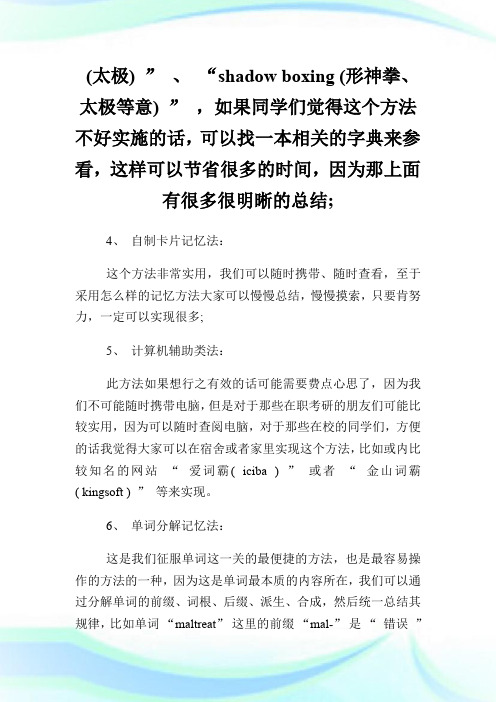
(太极) ”、“shadow boxing (形神拳、太极等意) ”,如果同学们觉得这个方法不好实施的话,可以找一本相关的字典来参看,这样可以节省很多的时间,因为那上面
有很多很明晰的总结;
4、自制卡片记忆法:
这个方法非常实用,我们可以随时携带、随时查看,至于采用怎么样的记忆方法大家可以慢慢总结,慢慢摸索,只要肯努力,一定可以实现很多;
5、计算机辅助类法:
此方法如果想行之有效的话可能需要费点心思了,因为我们不可能随时携带电脑,但是对于那些在职考研的朋友们可能比较实用,因为可以随时查阅电脑,对于那些在校的同学们,方便的话我觉得大家可以在宿舍或者家里实现这个方法,比如或内比较知名的网站“爱词霸( iciba ) ”或者“金山词霸( kingsoft ) ”等来实现。
6、单词分解记忆法:
这是我们征服单词这一关的最便捷的方法,也是最容易操作的方法的一种,因为这是单词最本质的内容所在,我们可以通过分解单词的前缀、词根、后缀、派生、合成,然后统一总结其规律,比如单词“maltreat”这里的前缀“mal-”是“错误”
之意,“treat”是“对待、应对”那么“maltreat”的意思就是“错误对待、虐待”的意思了; “proceed (步伐、进步之意) ”这里的“ceed”是“步伐、脚步”之意,前缀“pro”是“在。
前”,这里的意思就是“进步”了;谈到后缀,例子就比较多了,比如前面我们说的单词“considerably”这里的“ably”就是副词的后缀了,因此如果寻找大量单词总结这个后缀的话就非常有用了,派生和合成的方法比较简单,这里不再赘述了。
- 1、下载文档前请自行甄别文档内容的完整性,平台不提供额外的编辑、内容补充、找答案等附加服务。
- 2、"仅部分预览"的文档,不可在线预览部分如存在完整性等问题,可反馈申请退款(可完整预览的文档不适用该条件!)。
- 3、如文档侵犯您的权益,请联系客服反馈,我们会尽快为您处理(人工客服工作时间:9:00-18:30)。
2014海天考研英语词汇与规划(上课讲义)目录Unit 1 于丹文章于丹:我是好学校里的差生“我是好学校里的差生样本。
”日前,在北京四中的“校友论坛”上,于丹的演讲一开始就如此坦白:“当年,我的记忆也很辉煌,但那是一个差学生在一所好学校,生命如何被成全的记忆。
”1980 年,于丹初中毕业考入北京四中高中部,1982年毕业考入北京师范大学。
“上高中之前我是个沉默和内向的孩子,不说话,甚至有点自卑。
”于丹说自己不说话是因为没有说话的环境。
在那个特殊年代,父母都被下放,周围也没有幼儿园可上,只能和姥姥在家,“我因为孤单而读书,认为人与人之间存在误读,但是书籍永远不会背叛。
”“我从小偏科,数学从来没有学好过。
高中时代最对不起的是教数学的熊老师,经常被她追堵在操场上,领回去补数学。
当时文科一个班28个人,综合成绩我从来没有进过前20 名,一直是班里的尾巴。
”可是,即使这样,于丹认为自己的人格和梦想在这里得到了尊重,“这样的学校不以成绩论学生”。
她遇到了一群好老师。
当时,“文革”刚刚结束,国家百废待兴,老师们经历了各种曲折苦难重新回到了讲台。
教于丹的老师中,年龄最长的是外语老师,当年72 岁,一头稀疏的白发;班主任不到60 岁,算是年轻的;历史老师,一头雪白的头发,于丹记得他从眼镜框上面看学生时犀利而慈爱。
那时高考录取率只有3.5%,把这群学生送进大学是这批优秀老师的目标。
于是老师和学生几乎捆绑在一起。
当时高中学生住校,宿舍条件一般:都是平房,10 多个学生住在一间屋里。
于丹至今记得当年冬天每天下午都能看到的一个场景:刚刚做了手术,胃被切除了三分之二的语文廖老师,只能吃白开水泡饼干。
在晚上学生下自习之前,瘦小的廖老师在寒风里微弯着身体,披着一件黑棉衣,到每个宿舍去把炉子提前打开。
为了安全,他又把每个宿舍重新跑一趟,检查一遍。
“这些老师不光在教书,是在带孩子啊!当时没有升学率,没有因为成绩而发的奖金,他们只是在做一件事:为良心!”于丹记得当年的地理老师,说话很慢。
一次,和往常一样,老师提前来到班里。
那节课讲的是西风带与洋流。
和数学一样,于丹的地理也学的不好,她觉得这些内容非常枯燥、抽象。
可是下课时,同学们才知道,地理老师的母亲刚刚去世。
“一个50多岁的老师没有送别自己七八十岁的母亲。
这是怎样的伤痛!可是讲课时他没有说一句其他的话。
”后来于丹自己做了老师,她终于明白了一句特别朴实的话:“课比天大!”“不放弃每个学生,每个差生。
不因为一个学生的成绩好坏论定在班级的位置,每个生命都应该受到鼓励。
四中启迪了我的人格,我从这里获得生命的所有自信。
”于丹说。
在老师日复一日的陪伴和鼓励下,初中毕业时还整天不说话的于丹,在17岁上了大学后,第一年就当上了学生会主席。
多年以后,于丹在央视百家讲坛教授《论语》,在全国范围内激起了一股重读经典的热潮,她也受到观众的热捧。
2007 年3 月的一天,于丹在北京海淀书城签售《庄子心得》。
那是一个阴雨天,于丹从中午1点一直签到第二天凌晨。
当天下午四五点时,一张被雨水淋湿的了纸条从排队的读者中传了过来:“你的中学语文廖老师排在人群里,他从上午11点钟就来了。
”于丹急忙起身迎接,慌忙中带倒了椅子。
廖老师还是穿着一件厚厚的棉袄,踉跄进来,对于丹说了一句话:“于丹,教过你的几位老师已经过世,我替他们来看看你,你是好孩子。
”一句“你是好孩子”,让于丹再次提起仍泣不成声。
在送给老师的书上,于丹这样写道:“廖老师:这是我交给您的作文。
”“当年我是一个除了语文任何科目都不好的孩子,就是他一直在鼓励我写作文。
”于丹认为,四中的老师教会她一个朴素的道理,一个人永远不要放弃梦想。
回忆自己的中学时代,于丹觉得一切都是美好的:“那是80 年代,国门打开,我们爱诗歌,可以从古典诗词读到朦胧派,读哲学可以从黑格尔、康德一直到费尔巴哈的新马克思主义,到海德格尔、萨特;我们学数理化,也爱摇滚乐……”“我们把大量时间花在听音乐,读诗、写诗上。
当时学校很破烂,可是到处激荡着激情和梦想。
我们没有课外辅导班,因为老师所有的下课时间都在给我们进行一对一的补习。
”于丹记得高考之前,老师还带着他们在北京近郊写诗。
当时正上演一部备受批判和争议的电影——《苦恋》,可是老师带他们去看,回来后还让大家讨论。
于丹向自己的学弟学妹们发问:“今天中国的经济上来了,可是作为一个经济体的崛起,能替代政治、文化、思想上的崛起吗?所以中学生,作为中国的新力量,每个人应当思考,自己能为祖国做什么?因为每个人都与自己的国家命运相连。
”作为高校教师和文化名人,于丹获得许多奖,但她觉得最珍贵的奖来自一名小女生。
这个戴眼镜的女生在刚进大学新生军训时,连着几个晚上躲在被子里,在手电筒的照明下绣了一幅十字绣:一个穿着长裙的女人,牵着一个脏脏的小孩,手里还拿着一根穿着线的针。
这个女生在一张小纸条上写道:“每个小孩子都是天上的天使,因为翅膀断了落到地上当孩子。
每个孩子小时候,都记得天空和飞翔。
来到大人的世界,只要大人不训斥他们的鲁莽与荒唐,鼓励他们,为他们重新缝上翅膀,每个孩子都可以重新做回天使。
你是一个能为天使缝回翅膀的人。
”“不管我写多少书,做多少讲座,都不会改变老师这个职业。
这是我的最高梦想,会用一辈子去放飞。
老师不仅要传道授业解惑,还应有对学生生命的陪伴和提携。
”于丹说,自己从中学带走了一生的信仰。
Unit 2 大纲新增词2013 年全国硕士研究生入学统一考试英语(一)和(二)考试大纲新增的60个词汇详解1 accustom vt. 使习惯于(to) :~ oneself to rising early 使自己习惯于早起/ ~sb. to sea life 使某人习惯于海上生活/ ~ one's ears to the din使自己的耳朵适应喧闹声2 alienate vt. 1 使疏远,使不友好;离间;The management must never become~d from the employees.管理层决不能脱离员工。
2 【律】转让,让渡(财产等)3 使转移;使转向▷alienator n.3 allegiance n. 1 (对国家、政府、事业、个人等的)忠诚;效忠,忠贞:give~ to 效忠于2 (臣子对君主的)臣服义务3 (侨民对所居国政府的)效忠义务4 ape n. 1 无尾猿;类人猿2 猴3 粗野的大汉4 模仿者,学样的人vt. 模仿,学…的样adj. 〈口〉疯狂的;狂热的◇go ~ 〈口〉发疯;变得狂热:go ~ overa girl 为一个姑娘神魂颠倒▷apelike adj. / aper n.5 archaeology n. 1 考古学2 (某民族的)文化遗迹,古迹▷archaeological adj. / archaeologically adv. / archaeologist n. /archaeologize vi.6 bail1 n. 【律】保释金;保释人;保释;accept ~ 准许保释vt. 1 保释(某人);(法官)将(在押犯)交保释放2 托付(财务)~ out 1 保释:~ sb. out 保释某人2 帮助(某人)脱离困境;从困境中摆脱出来/ forfeit ~ 保释后不出庭候审/ go (stand)~ for 做…的保释人;为…提供保释金/ hold sb. to ~拘留某人直至交保/ jump ~ 〈口〉=forfeit ~ / on ~ 交保后:be out on~ 在保释中/ post ~ 缴纳保释金/ save (surrenderto) one's ~保释后如期到庭受审bail2 n. 戽斗,桶(用来舀出船舱里的水)vt. 舀(水);从(船)中舀水(out) :~ (out) the boat (或~water outof a boat )舀出船舱里的水vi. 舀出船舱里的水on 〈美口〉让…失望/ ~ out 1 (从飞机上)紧急跳伞2畏难而去▷bailer n.bail3 n. 1 [~s]【史】(城堡的)外层防卫桩;栅栏2 (厩内的)横栏3 (板球的)三柱门上的横木4 〈澳〉(挤乳时)扣住母牛头部的闸架◇~ up 〈澳〉1 (挤乳时)用闸架扣住(母牛)的头部2 拦路抢劫 3 〈口〉(尤指为交谈而)拦住,强行留住(某人)bail4 n. 1 (车棚等)半圆形棚架2 (壶、桶等的)半圆形拎环3 (打字机上的)压纸杆7 blog n. 博客,网络日志8 botany n. 1 植物学2 [总称](某地区的)植物9 buzz n. 1 嗡嗡声,蜂音2 嘁嘁喳喳,噪杂声3 〈口〉流言谣言4 (蜂鸣器等发出的)信号声5 〈口〉电话:give sb. a ~ 给某人打电话6 骚动7 〈美口〉(吸毒或饮酒产生的)陶醉感;兴奋vi. 1 (蜂等)嗡嗡叫,(机器等)营营响2 用蜂鸣器发出信号3 忙碌,忙乱;急行:~ about (或around)到处奔忙/ ~ along匆忙走过4 嘁嘁喳喳;说闲话;充满低沉嘈杂的声音vt. 1 使嗡嗡叫,使营营响2 用蜂鸣器传呼;〈口〉给…打电话3 私下说出(或传播);嘁嘁喳喳地表示;私下告诉(某人):~ a rumour 暗中散播谣言/ The committee ~ed its indignation.委员们异口同声表示愤慨。
4 猛扔(石子等)5 (飞机)低飞掠过;高速飞行(另一飞机)进行骚扰6 〈英方〉喝完(一瓶酒)◇~ off 〈口〉走开,离去10 censorship n. 1 审查(制度),检查(制度)2 审查员(或检查员)的职位3 【心】潜意识压抑力(或作用)4 古罗马监察官的职位(或权力)11 comet n. 【天】彗星▷cometary adj.12 contagious adj. 1 (接)触(传)染的;(有)触染性的;带触染源的:a ~ disease传染病/ a ~ ward 触染病房2 (情绪等)感染性的;蔓延的;会扩散的:~ laughter 有感染力的笑声▷contagiously adv. / contagiousness n.13 converge vi. 1 (道路、车辆、人群等)会合,集中2 为共同利益(或目的等)会聚;趋同3 【数】收敛vt. 使会合,使集中;使会聚14 culprit n. 1 犯人,罪犯2 导致过错的人;事故的起因;问题的根源:The real ~ is thegreenhouse gases. 问题的真正原因就是温室气体。
15 daunt vt. 威吓;使胆怯,使气馁:He felt completely ~ed by thedifficulties. 他完全被困难吓倒了。
